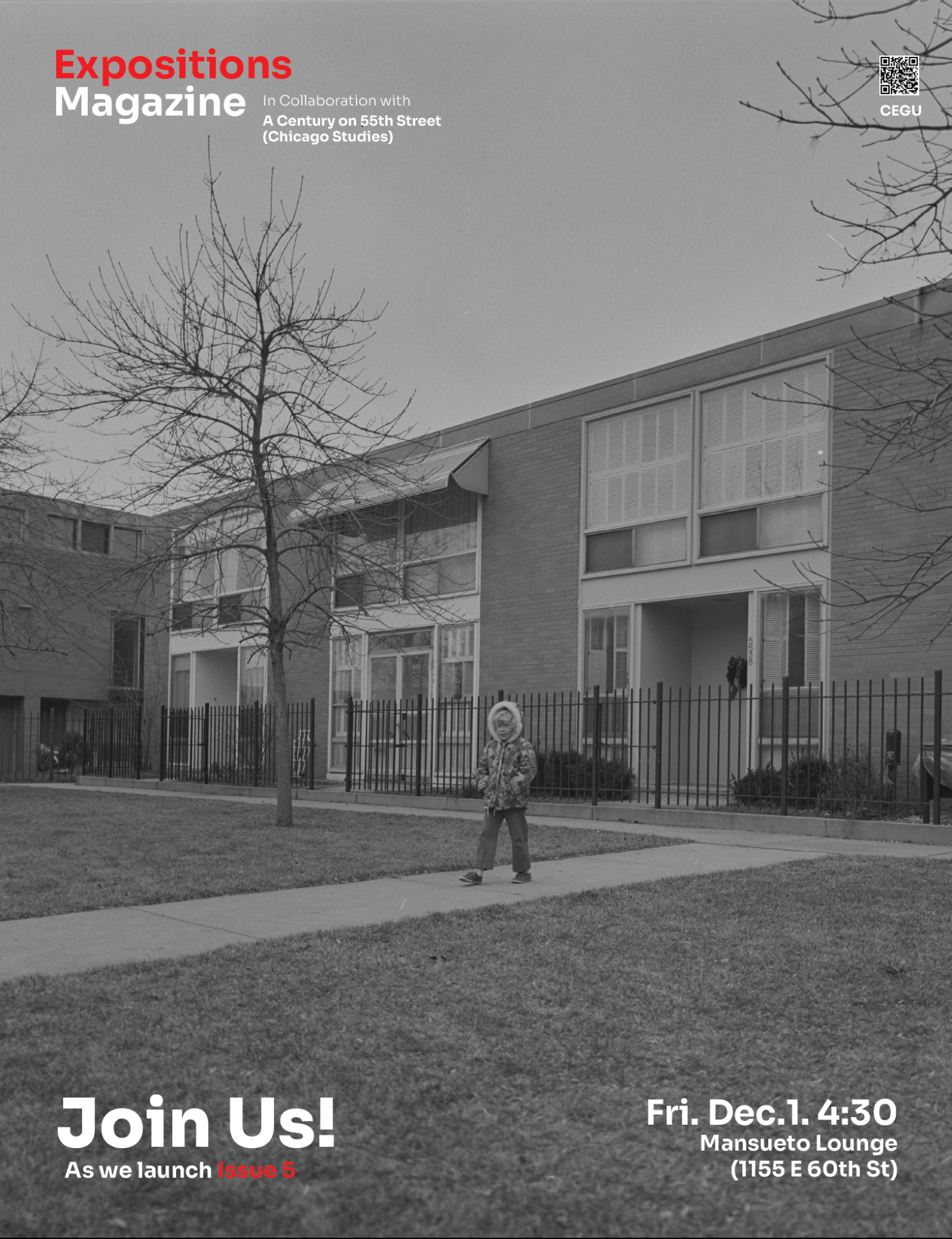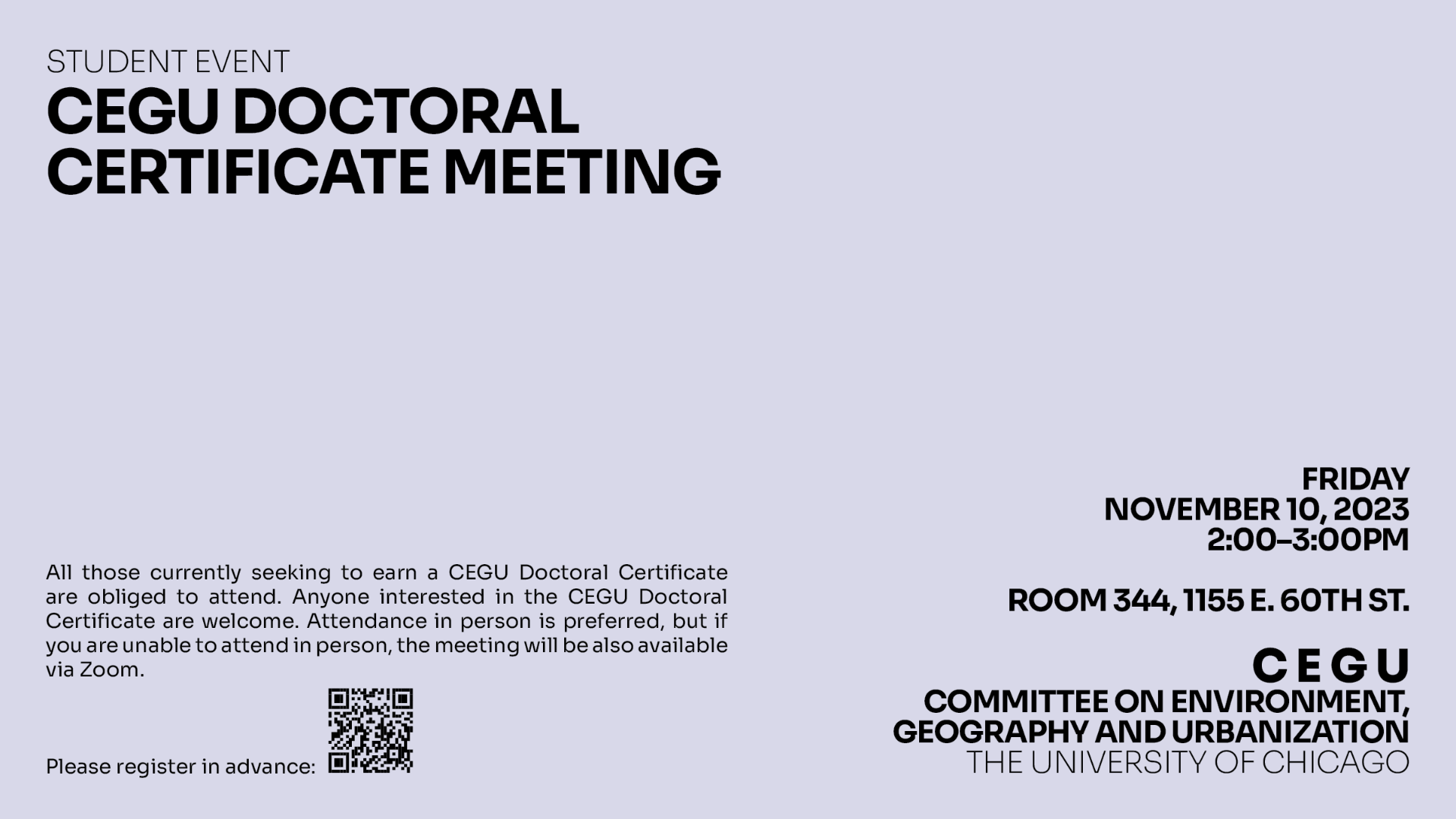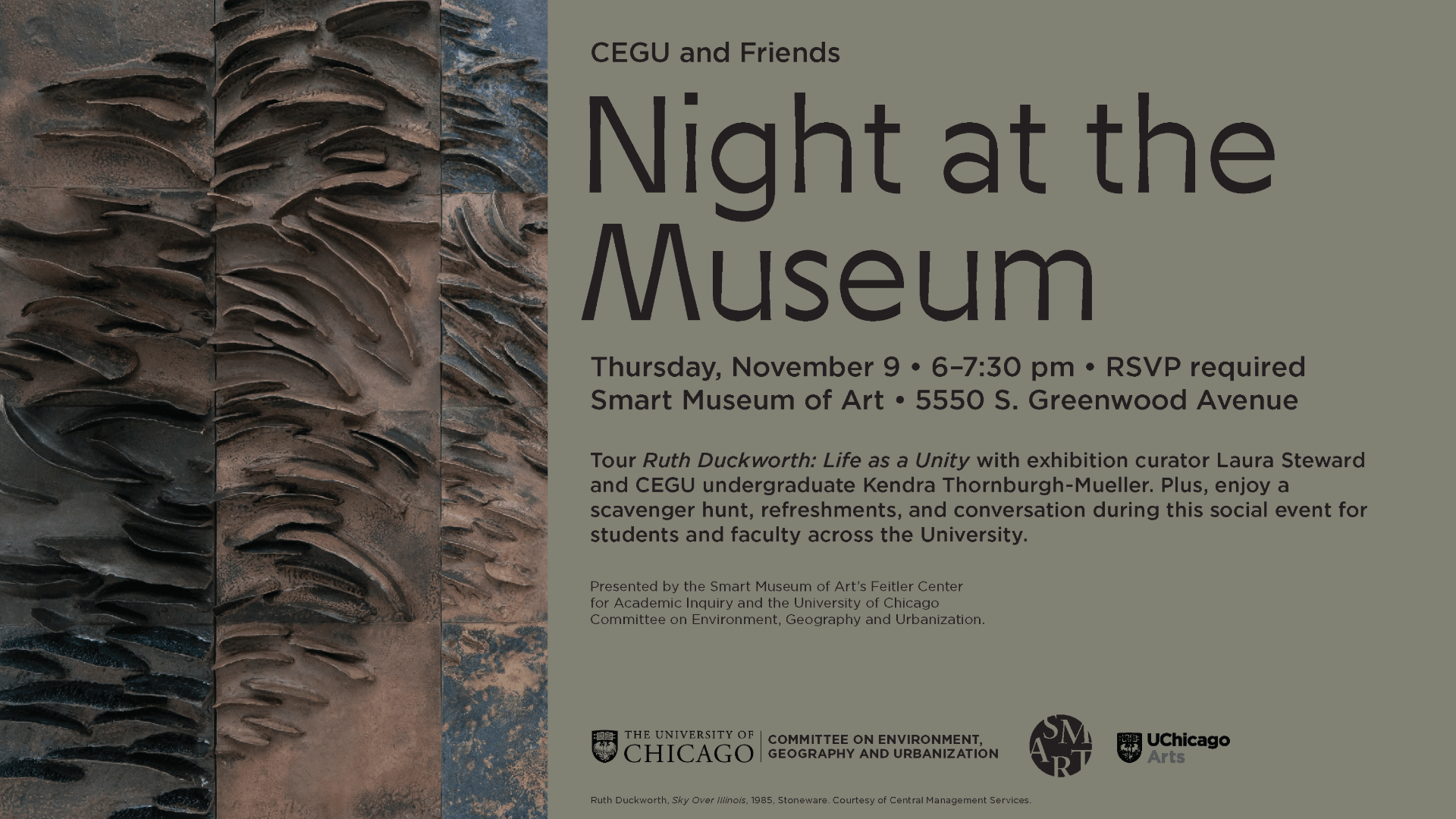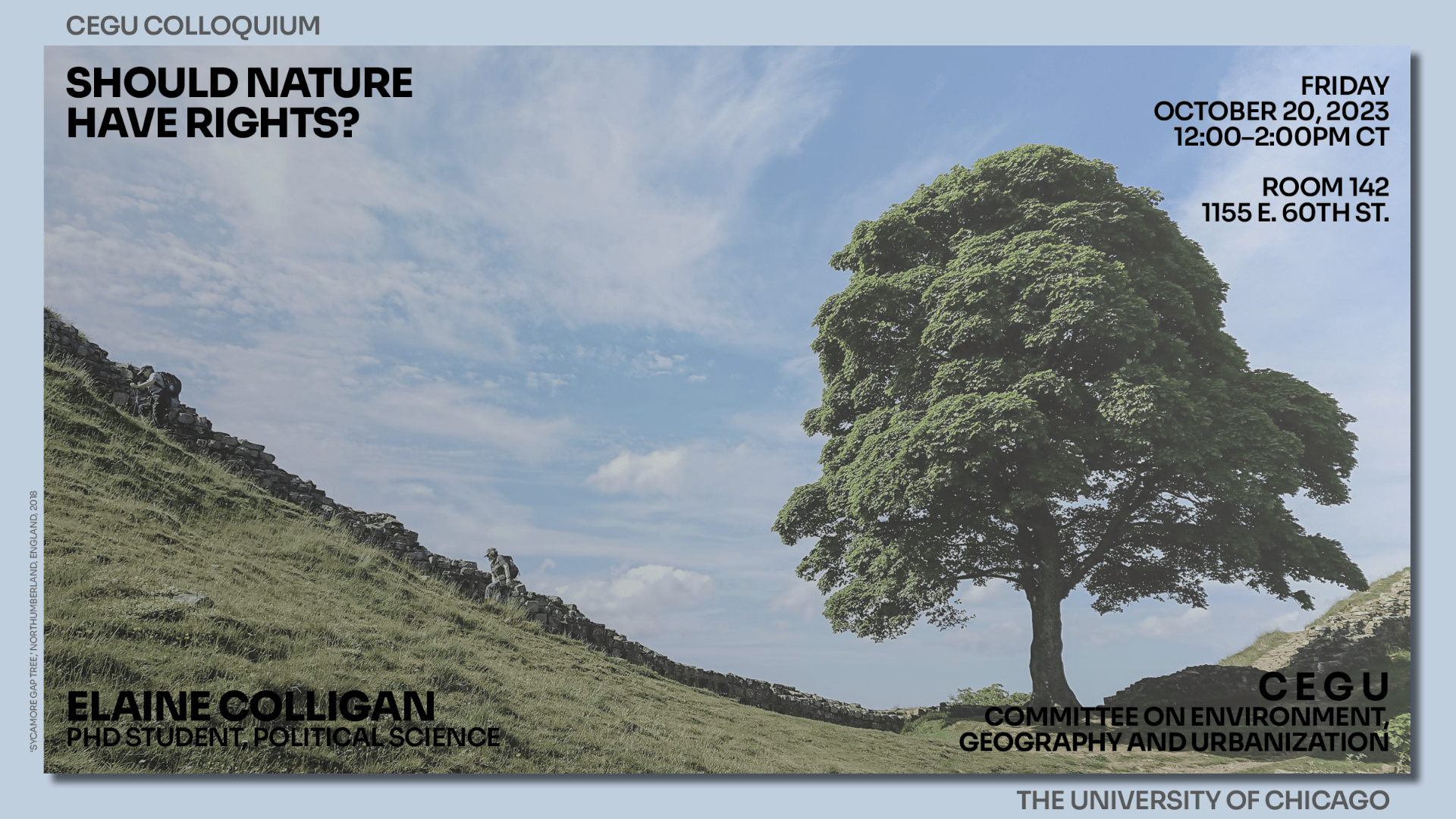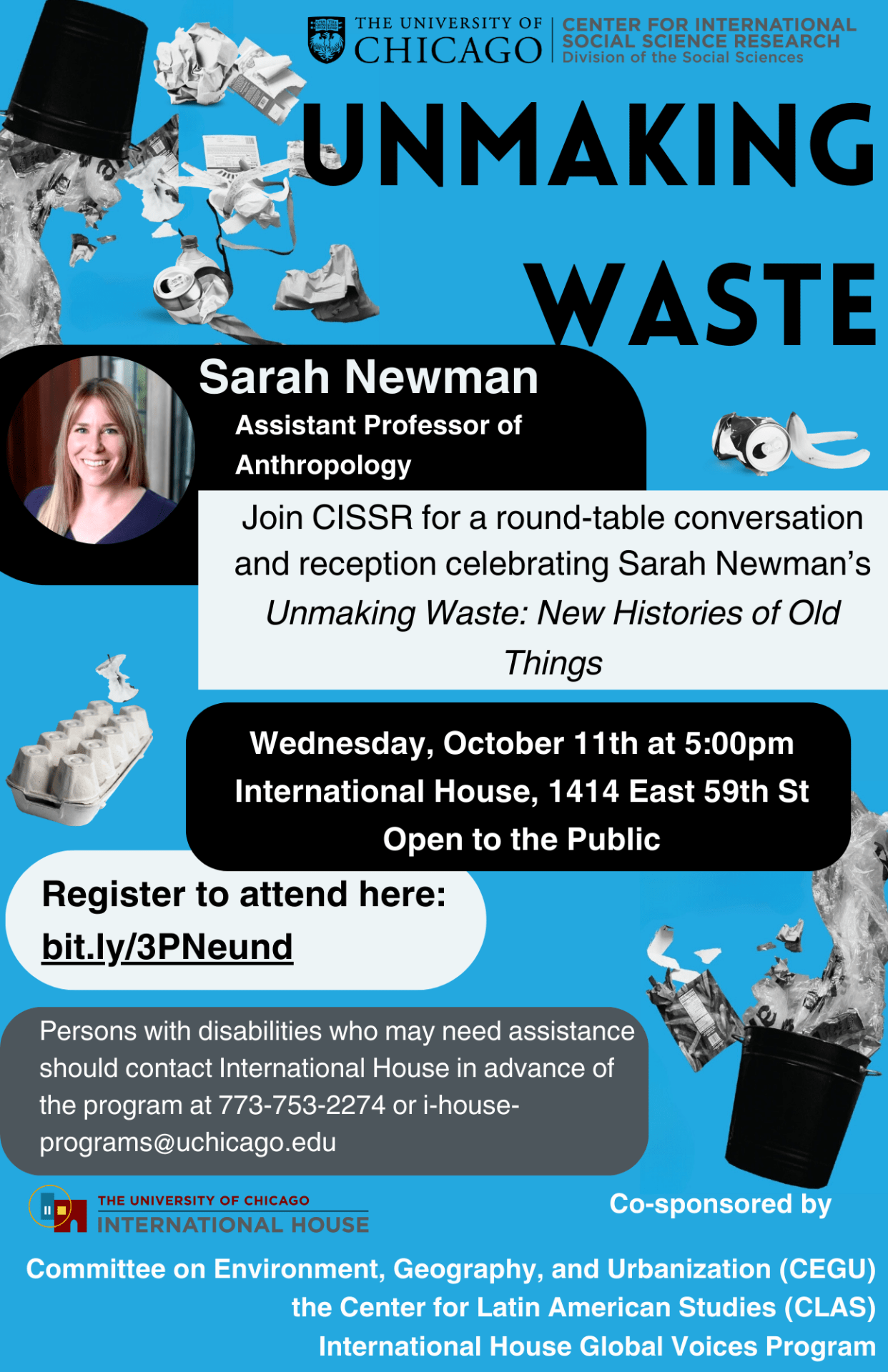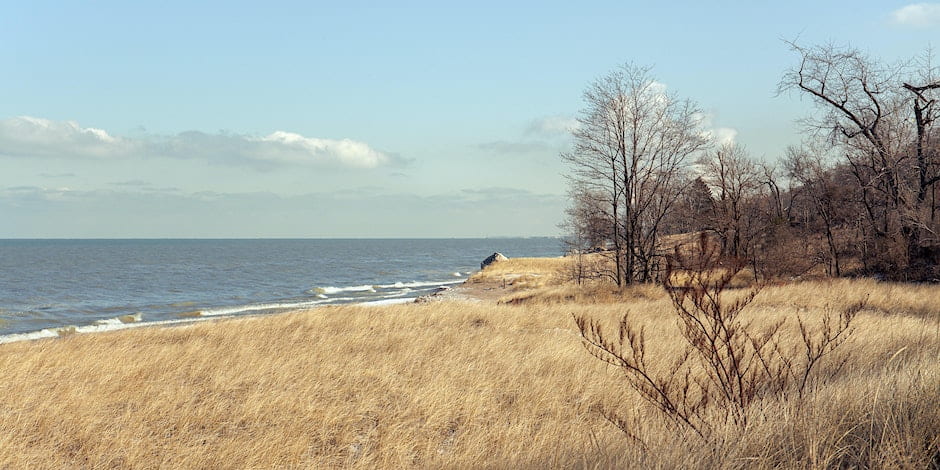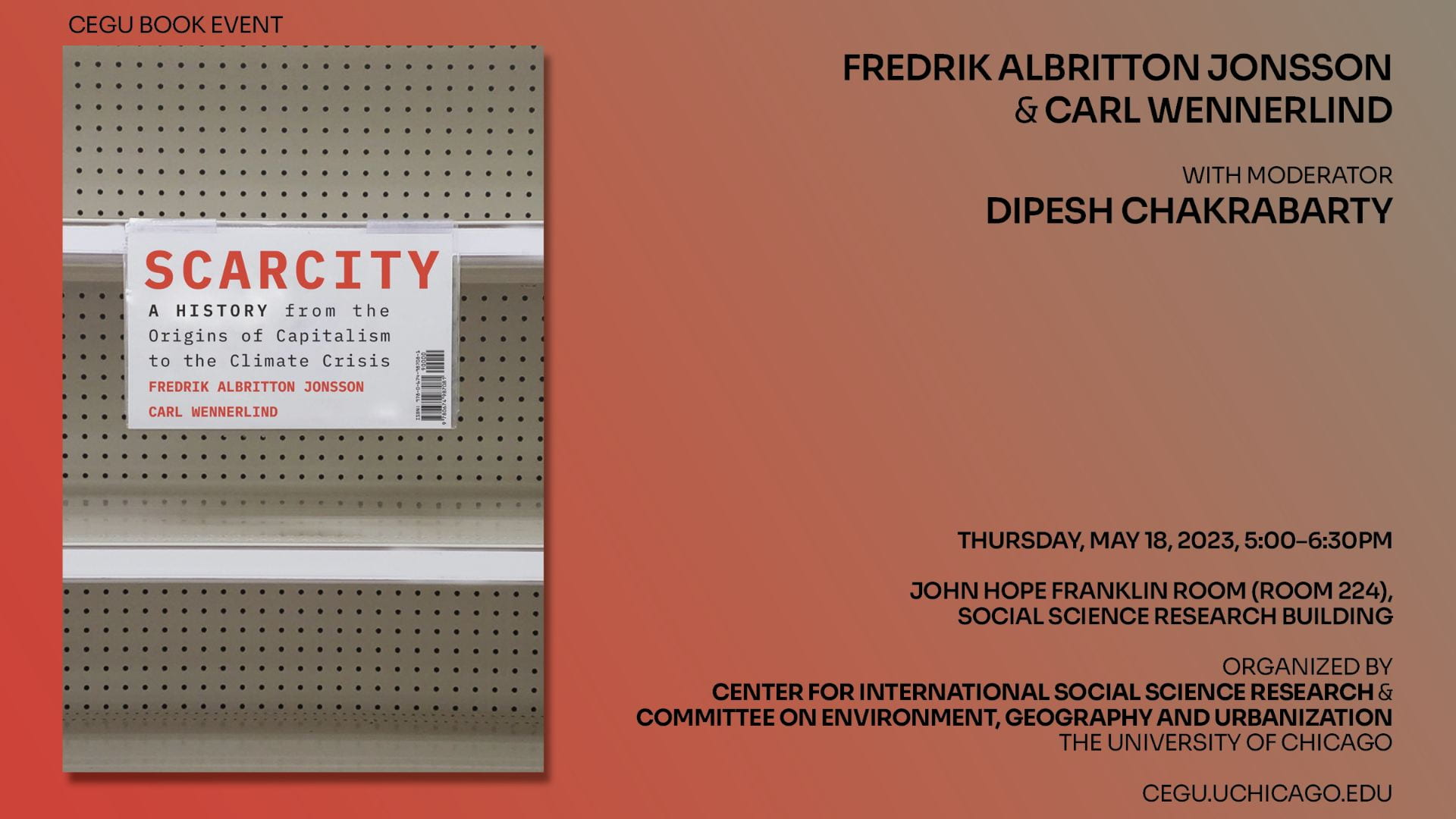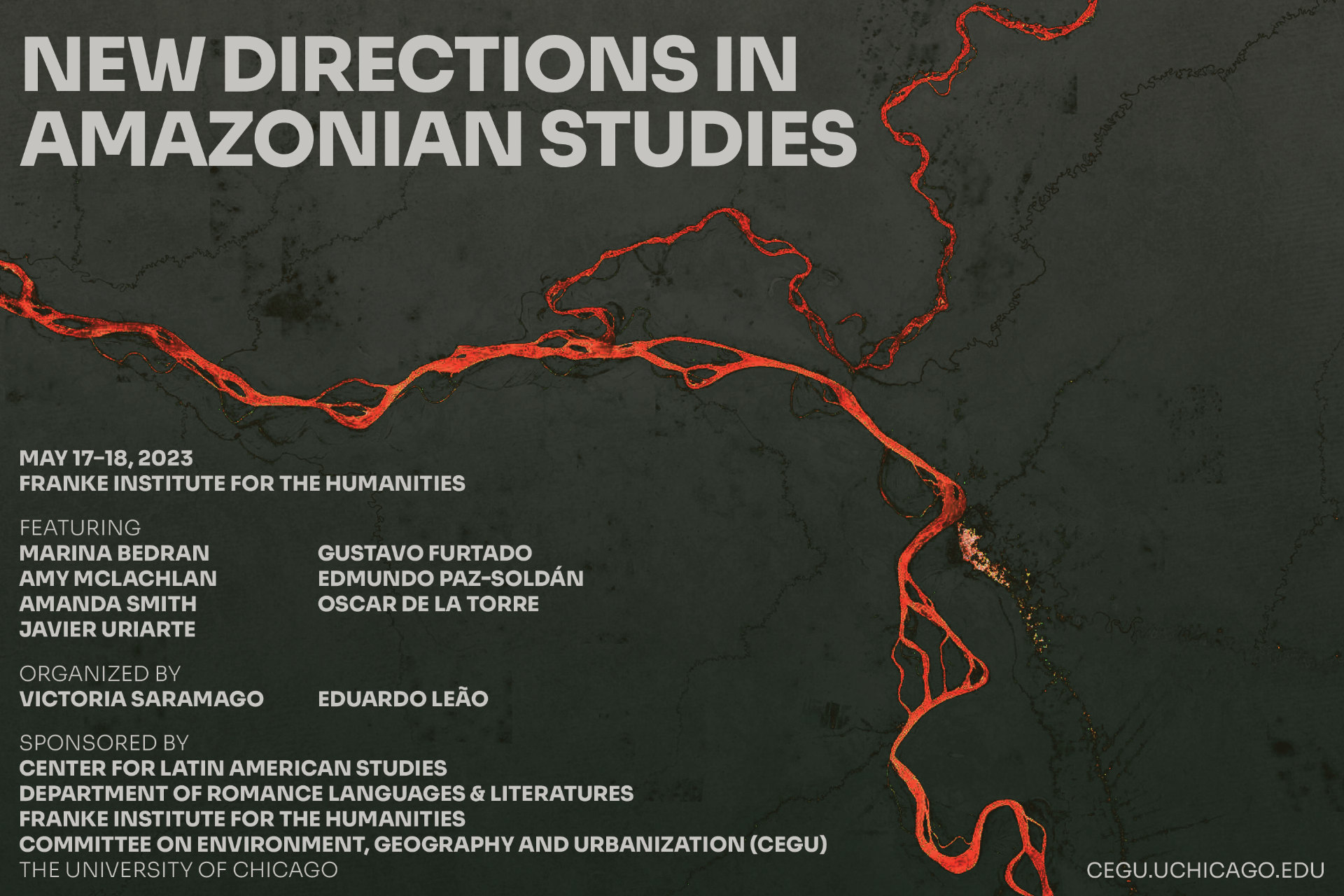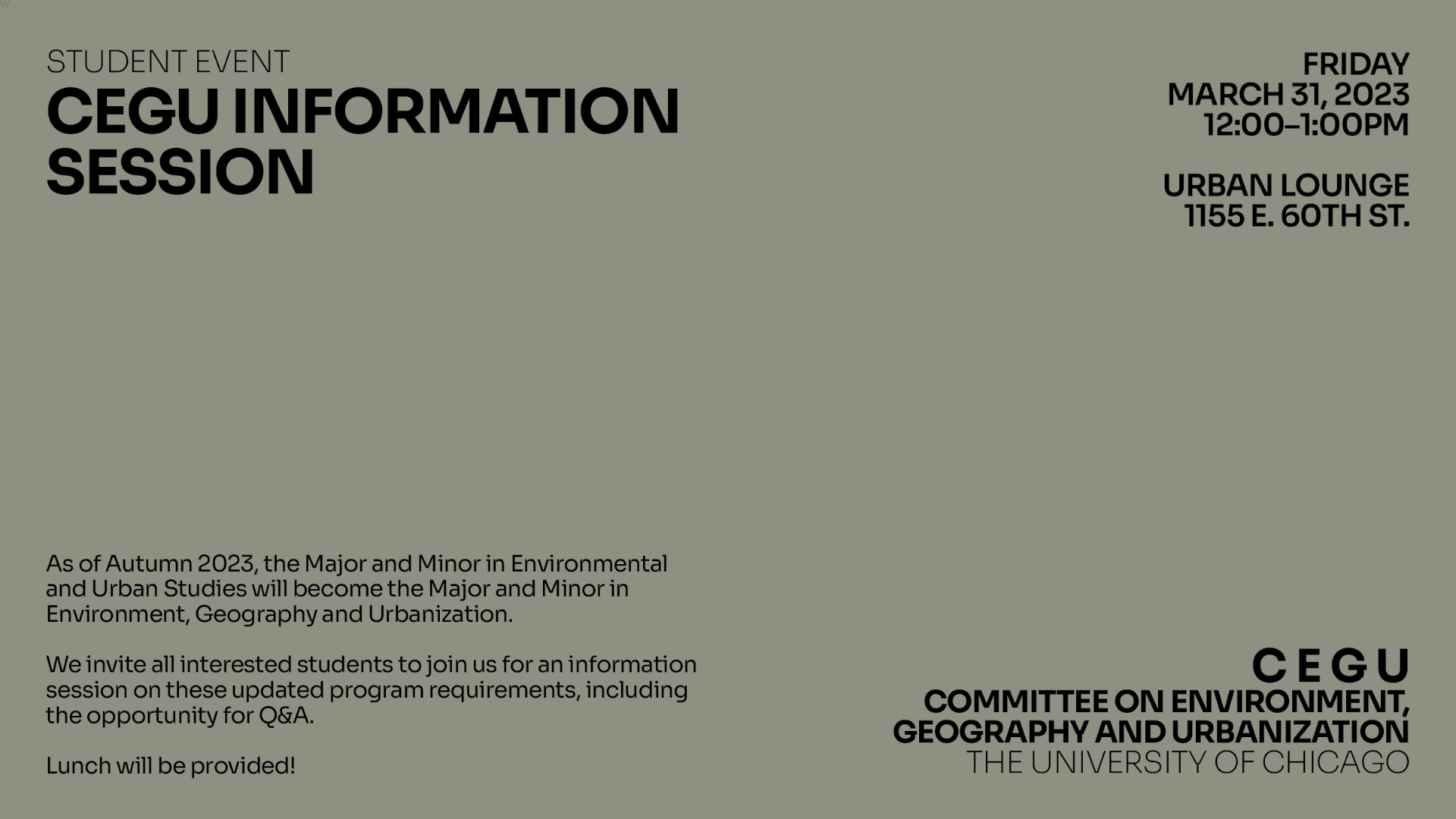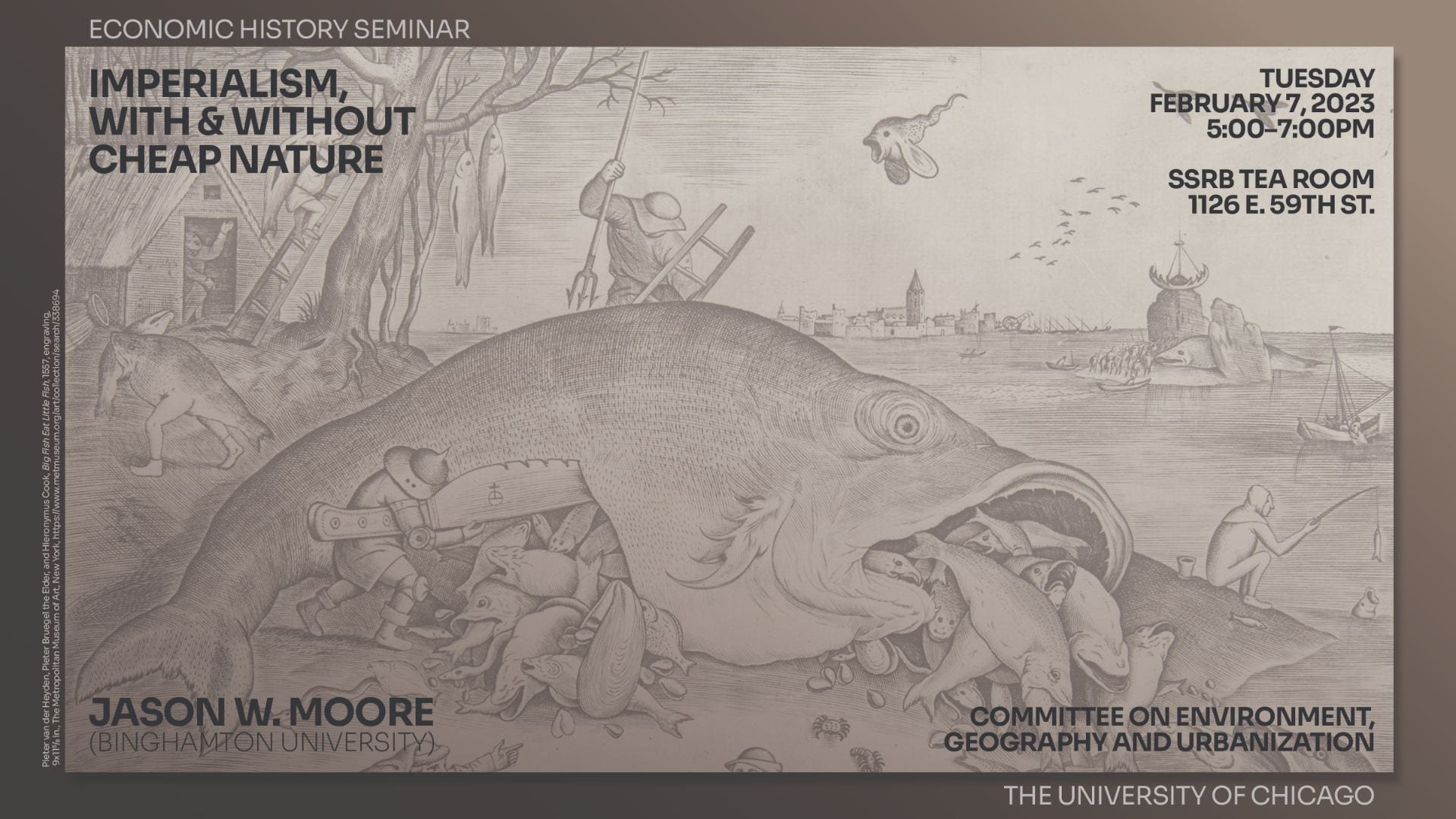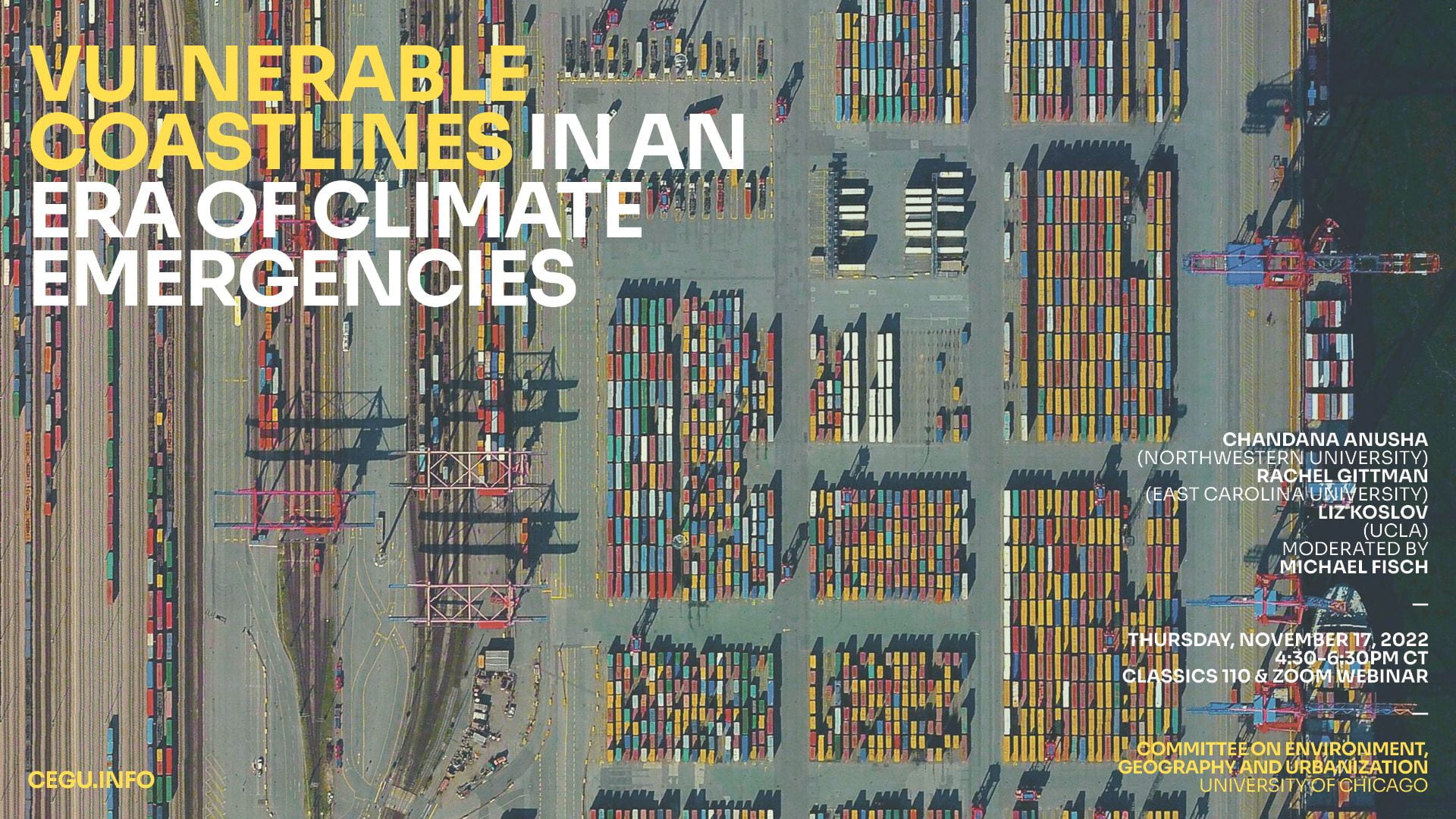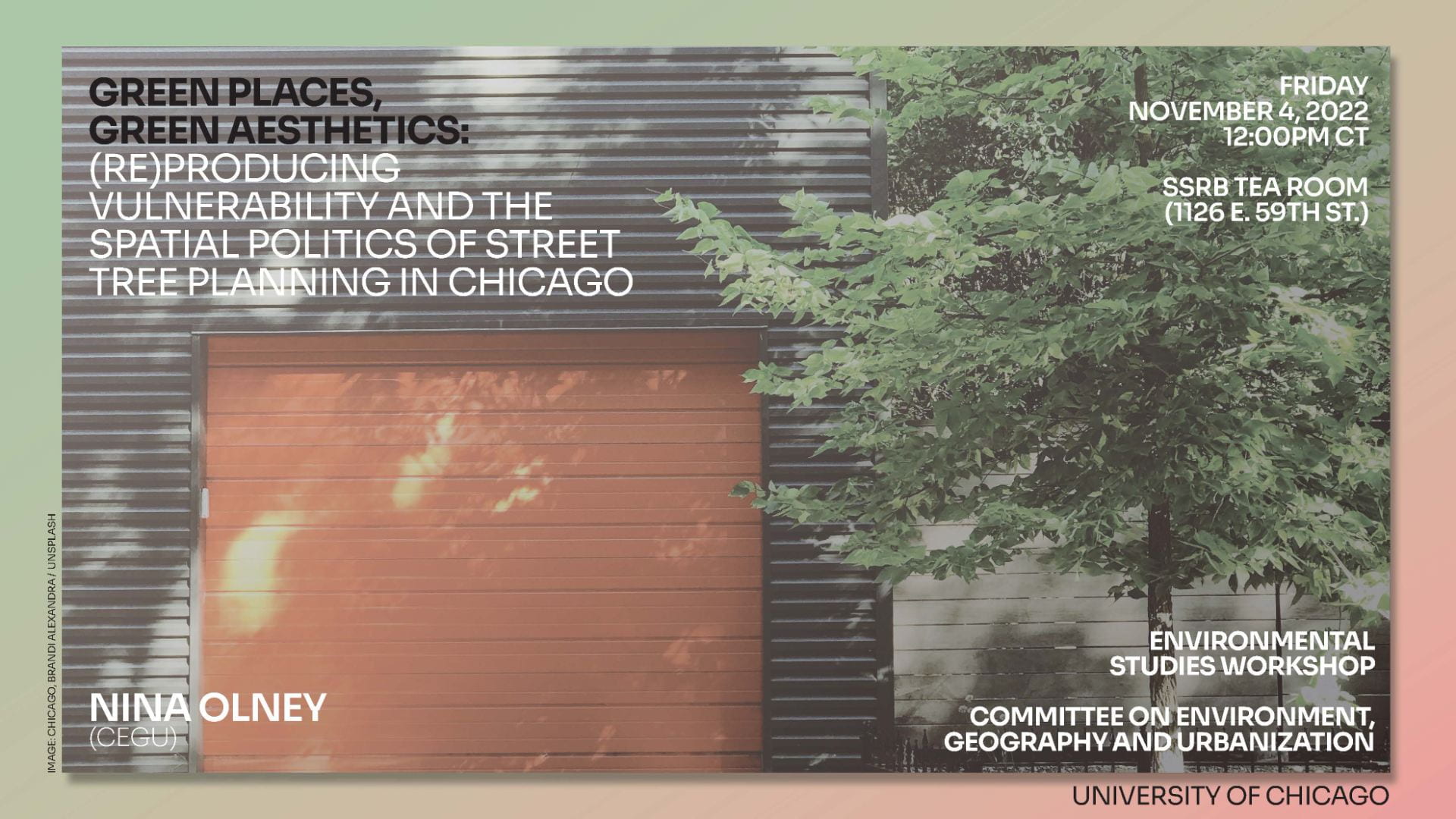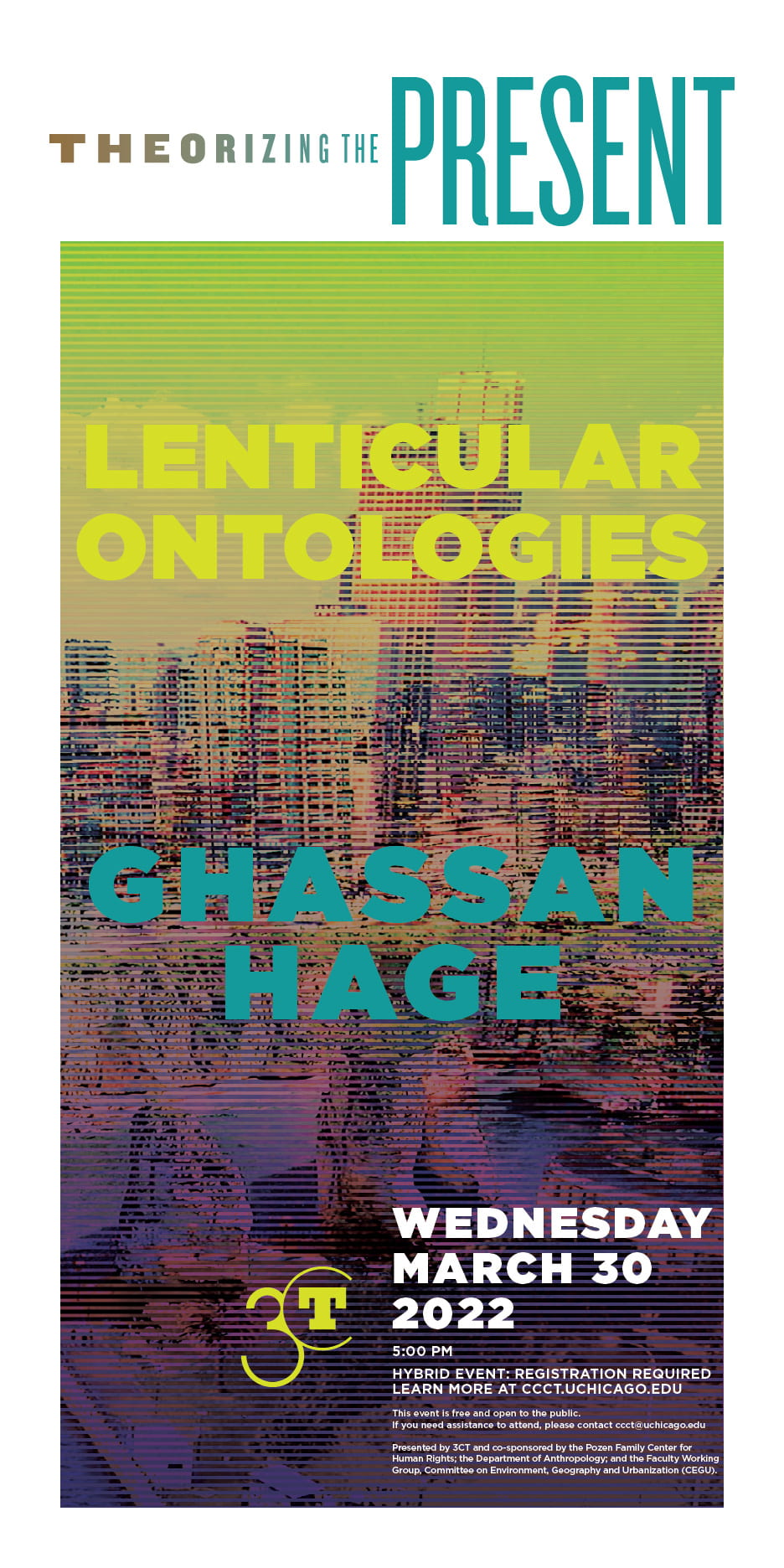Category: All Events, Public Events, Student Events, CEGU Colloquium
CEGU Colloquium
Alyssa Mendez, Ph.D. Student in Anthropology
Friday, May 17, 2024
12:30pm
Room 344, 1155 E. 60th St.
Student Event
Friday, May 17, 2024, 4:30pm
Mansueto Institute Lounge, 1155 E. 60th St.
More Info
CEGU's student-run magazine, Expositions, launches their seventh issue. Pick up a copy, have a bite to eat, and hear from the many writers, editors, photographers, illustrators, designers, and sound artists who contributed.
Co-sponsored Event
Kohei Saito, University of Tokyo
Wednesday, May 22, 2024, 5:00pm
Room 122, Social Science Reseach Building (1126 E. 59th St.)
More Info
Kohei Saito is associate professor of philosophy at the University of Tokyo and the author of Slow Down: The Degrowth Manifesto (2024), Marx in the Anthropocene (2023), and Karl Marx’s Ecosocialism: Capital, Nature, and the Unfinished Critique of Political Economy (2017).
This event is co-sponsored by CEGU, the Franke Institute for the Humanities, 3CT, the Practical Philosophy Workshop, the German Philosophy Workshop, and the Department of Philosophy.
Student Event
Friday, May 24, 2024, 9:00–5:00pm
Room 142, 1155 E. 60th St.
More Info
Join us on Friday, May 24th for the CEGU BA Thesis & Capstone Symposium, to be followed by an end-of-year celebration in the 1155 courtyard.
PAST EVENTS
Co-sponsored Event
Brian Balogh, University of Virginia
Sarah Fredericks, University of Chicago
Wednesday, May 15, 2024
2:30pm-4:00pm CT
SSRB Tea Room (Room #201)
More Info
Published in January 2024, Not In My Back Yard: How Citizen Activists Nationalized Local Politics in the Fight to Save Green Springs tells the story of “how a woman-led citizens’ group beat a Southern political machine by enlisting federal bureaucrats and judges to protect their neighborhood from unchecked economic development.”
This narrative delves into the local political activism shaping Green Springs, Virginia, chronicling the enduring struggle spanning decades to safeguard the area. It sheds light on the intricate economic compromises linked to environmental preservation, the genesis of NIMBY (Not In My Backyard) sentiment, the evolving dynamics of local governance, and the unexpected influence of historical narratives on public policy advancement.
Co-sponsored Event
May 10–11, 2024
Regenstein Library
More Info
Ecology has become a subject of increasing concern among social and natural scientists in Japan as a result of climate change and disaster management. At the same time, the trend toward specialization of fields in university programs has made it rare for researchers in the social and natural sciences to meet and share ideas, let alone work together in the field. This symposium responds to this dilemma by creating a space for dialogue concerning ecology between the natural and social sciences in Japan. Drawing inspiration from thinkers such as Imanishi Kinji, whose research and writings bridged practice and theory, this group aims to develop an interdisciplinary conversation on topics related to ecology and the natural environment in Japan. To this end, the symposium brings together researchers from the social sciences and natural sciences.
Organized by UChicago Library and the Center for East Asian Studies.
Second Annual CEGU Conference
Calvin & Freda Redekop Lecture in Environment and Society by Silvia Federici
Frizzell Family Learning & Speaker Series Presentation by Jake Bittle
Panels Featuring Alyssa Battistoni, Sharad Chari, Susanna Lidstrom, James McCarthy, Robert Nichols, Marcy Norton, Álvaro Sevilla-Buitrago, Matthew Shutzer, Omar Dahbour, Flora Lu, and Ashley Dawson
Organized by Fredrik Albritton Jonsson, Oliver Cussen, Sabina Shaikh, and Nicole Whalen
May 9–10, 2024
International House
CEGU Colloquium
Brett Christophers, Uppsala University
with interlocutor Jo Guldi, Emory University
Friday, May 3, 2024
12:30pm
Room 344, 1155 E. 60th St.
More Info
What if our understanding of capitalism and climate is back to front? What if the problem is not that transitioning to renewables is too expensive, but that saving the planet is not sufficiently profitable? This is my claim. The global economy is moving too slowly toward sustainability because the return on green investment is too low. Today's consensus is that the key to curbing climate change is to produce green electricity and electrify everything possible. The main economic barrier in that project has seemingly been removed. But while prices of solar and wind power have tumbled, the golden era of renewables has yet to materialize. The problem is that investment is driven by profit, not price, and operating solar and wind farms remains a marginal business, dependent everywhere on the state's financial support. We cannot expect markets and the private sector to solve the climate crisis while the profits that are their lifeblood remain unappetizing. But there is an alternative to providing surrogate green profits through subsidies: to take energy out of the private sector's hands. An essential intervention, The Price Is Wrong is as politically far-reaching as it is factually illuminating.
Presented in affiliation with the Economic Planning and Democratic Politics project at the Neubauer Collegium
Student Event
cookie & coffee break
Wednesdays
3:00–5:00pm CT
Urban Lounge, 1155 E. 60th St.
More Info
Join CEGU and Chicago Studies for our weekly Cookie & Coffee Break in the Urban Lounge at 1155 E. 60th Street. Students are welcome to use this time for studying, collaborating on projects, advising with faculty and staff, or simply hanging out! Free cookies and coffee will always be provided. We hope to see you there!
Frizzell Family Learning & Speaker Series
Monday, April 22, 2024, 6:30–7:30pm
Urban Lounge, 1155 E. 60th St.
More Info
This Earth Day, join us for an engaging evening in the Urban Lounge as we reconnect with UChicago alumni and explore the impact of the university on their experience after graduating. We will explore the pivotal experiences during their time as an undergraduate that shaped their careers, how they cultivated Chicago-based connections, and the skills crucial for success in their current paths. This event will feature alumni from a diverse array of fields, providing the opportunity for students to foster personal connections and explore shared experiences with alumni. Dinner will be provided.
CEGU Colloquium
Emma Pask, Ph.D. Candidate in Anthropology and the Conceptual and Historical Studies of Science
with respondant Hadeel Badarni, Ph.D. Candidate in Anthropology
Friday, April 19, 2024
12:30pm
Mansueto Lounge, 1155 E. 60th St.
More Info
A dilapidated cotton warehouse owned by Huntsville Prison in East Texas became the home to over a million bats in the 1990s. This state-protected urban bat colony now poses a public health threat to both the residents of the town and the men imprisoned across the street. Human life and wildlife are treated as worlds apart even in their shared ecological reality: as unlivable heat worsens every summer, the inmates are denied air-conditioning and animal migratory patterns are drastically altered, but only the bats are advocated for by the state of Texas.
My dissertation is a historically oriented anthropological investigation of Texas’ ecology and the ecologists who study it. It is particularly interested in the settler colonial formation of “the range” as an ecological, geographic, mythical, and political landscape. I propose to present material from the third chapter of the dissertation to CEGU’s workshop, which explores the study and management of human-wildlife conflicts in Texas—what I call their arrangements. My ethnography of the state-employed ecologists called in to resolve the conflict at the Huntsville prison serves as this chapter’s central example. By exploring the way scientists navigate the boundaries of humans and animals, species and race, prisoners and pests, and protection and threat in this complicated terrain and within this case study, I ask how health – of animals, Texans, and the state as a whole – is configured and re-configured on the range and under the conditions of runaway climate change.
Co-sponsored Conference
Keynote by John D. Garrigus
Panels Featuring Paul Cheney, Camille Cordier, Oliver Cussen, Deirdre Lyons, Rachel Sarcevic-Tesanovic, and Rachel Tils
Friday, April 19, 2024, 9:00am–6:00pm
John Hope Franklin Room, 1126 E. 59th St.
More Info
Scholars have come to understand the colonies of Saint-Domingue, Martinique, Guadeloupe, and the larger French Antilles as sites of some of the most dynamic transformations of the eighteenth-century Atlantic world. They were fertile grounds for subaltern intellectual generation and resistance–societies in which slavery, race, class, family, intimacy, fugitivity, commerce, and capitalism jostled against one another. This conference seeks to bring together scholars researching and developing new projects on these inherently unstable and violent spaces using the methodologies of social, economic, gender, and environmental history. Our presentations will collectively explore questions of scale as a historical and historiographic phenomenon: How did the realities of environmental degradation on a single Saint-Dominguan plantation inform discourses and flows of capital? How did illicit exchanges of essential goods shape larger regimes of commercial exchange and regulation? How did people of color use kinship networks to carve out economic, social, and bodily autonomy amidst the oppression of slavery and abolition? How did enslaved and free people of color use their knowledge of these islands to form communities of resistance with revolutionary potential? In asking questions that mediate between the individual and the global, we hope to illustrate how these small colonies served as vital nodes in global networks of commerce, kinship, and revolutionary fervor that both connected and ruptured the Atlantic world.
Sponsored by the Department of History, the Franke Institute for the Humanities, the Center for Latin American Studies, the Center for the Study of Race, Politics, and Culture, the France Chicago Center, and the Committee on Environment, Geography and Urbanization.
CEGU Colloquium
Mehrnoush Soroush, CEGU & NELC
with respondant Mary Beth Pudup, CEGU
Friday, April 12, 2024
12:30pm
Mansueto Lounge, 1155 E. 60th St.
CEGU Event
Alexander Arroyo, The University of Chicago
Tone Huse, University of Tromsø
Berit Kristoffersen, University of Tromsø
Michael Watts, University of California, Berkeley
Thursday, March 28, 2024, 12:00pm
Mansueto Lounge, 1155 E. 60th St.
More Info
Join us for a lunchtime seminar on the remaking of Arctic seascapes as a frontier space for an expansive and growing ocean economy. The event will explore how the Arctic Ocean and surrounding seas are paradoxically made increasingly valuable as they are made increasingly vulnerable to multiple pressures: polar-amplified warming, sea ice retreat, pollution, deep sea mining and drilling, surveying and surveillance, harvesting and over-exploitation at an unprecedented rate and scale.
Focusing primarily on the Norwegian context, the event will feature Tone Huse (Associate Professor, University of Tromsø) presenting work from her recent book Nature-made Economy (MIT Press 2023, with Kristin Asdal) on the commodification of Arctic cod as a prism for understanding the economization of the ocean, followed by Berit Kristoffersen (Associate Professor, University of Tromsø) and Alexander Arroyo (Affiliated Faculty CEGU/Senior Research Associate & Associate Director, Urban Theory Lab, University of Chicago) presenting research on the role of the ice edge in shaping new oil, gas, and (most recently) seabed mineral frontiers. Michael Watts (Professor Emeritus, UC Berkeley), collaborator on this research, will act as moderator and provide a short commentary after the presentations.
Vegetarian boxed lunches will be provided.
Organized by the Committee on Environment, Geography and Urbnanization at The University of Chicago with support from the Peder Sather Center for Advanced Study at the University of California, Berkeley.
CEGU Colloquium
Venus Bivar, Associate Professor of Environmental History, University of Oxford
Friday, March 29, 2024
12:30pm
Mansueto Lounge, 1155 E. 60th St.
More Info
My current book project, Unsafe Harbour: A Political Ecology of Postwar Marseille, is rooted in the intersecting histories of industrial pollution, economic development, and urban planning. Pulling together these various research threads is a lawsuit concerning ricin poisoning at Le Corbusier's Cité Radieuse. As an iconic embodiment of all that was promised by modernity, the building serves as a starting point for thinking about the various postwar projects that attempted to forestall economic decline, from the expansion of port facilities on the periphery to gentrification efforts in the centre. By examining the environmental fallout of these projects, this research contributes to our understanding of how the logic of extractivism has shaped the fortunes of the city and its people.
Venus Bivar was recently appointed to the University of Oxford's first dedicated post in environmental history. Her research interests lie at the intersection of economic history and the environment, and in particular she is interested in the extraction of natural resources, industrial pollution, and economic growth. She is currently writing a book on the environmental consequences of the rise of petrochemicals in postwar Marseille. Her first book, Organic Resistance: The Struggle Over Industrial Farming in Postwar France (UNC Press 2018), was awarded the J. Russell Major Prize from the American Historical Association, as well as an honourable mention for the Society for French Historical Studies' Pinkney Prize, and was shortlisted for both the Canadian Historical Association's Wallace K. Ferguson Prize, and the Council for European Studies' Book Award.
Student Event
Miho Ouyou, Pulitzer Center on Crisis Reporting
Minsha Ouyou, Pulitzer Center on Crisis Reporting
Evan Carver, UChicago CEGU (moderator)
Monday, March 25, 2024, 12:30–1:30pm
Room 319, 1155 E. 60th St.
More Info
Join journalists from the the Pulitzer Center on Crisis Reporting for a lunchtime conversation on careers in climate journalism. Miho Ouyou is a Journalist and Post-Grad Reporting Fellow and Minsha Ouyou is a Journalist and Guest Contributor. The Pulitzer Center on Crisis Reporting is a news media organization established in 2006 that sponsors independent reporting on global issues that other media outlets are less willing or able to undertake on their own. The Center’s goal is to raise the standard of coverage on international, systemic crises and to do so in a way that engages both the broad public and government policymakers. Lunch will be provided.
Recent publications:
- Japan’s Seafood Producers Are Feeling the Economic Fallout of China’s Ban on Imports↗
- Japan’s Plan To Discharge Radioactive Water Into the Sea Worries Residents↗
Student Event
Friday, March 1, 2024, 4:30–6:00pm
Mansueto Lounge, 1155 E. 60th St.
More Info
Join organizers and authors of CEGU's Exposions Magazine for the launch of our sixth issue. Hear from contributors, meet the team, pick up a copy, and enjoy some refreshments.
CEGU Colloquium
Derick Anderson, Instructional Assistant in CEGU
Friday, February 23, 2024
12:30pm
Tea Room, 1126 E. 59th St.
CEGU Colloquium
Yuting Dong, History & CEGU
Friday, February 16, 2024
12:30pm CT
Mansueto Lounge, 1155 E. 60th St.
More Info
From 1986 to 2002, Japan has offered three rounds of financial and technological assistances in building and expanding Changchun’s second Water Purification Plant (WPP). With Japan’s assistances, this regional capital in Northeast China is equipped with a world-class water filtration system that provides crystal clear and clean drinking water to its residents. As the last chapter of my book manuscript (Japan’s Infrastructure Empire), this paper explores the history behind such assistances and show how imperial infrastructure building casts a long shadow in the former colonies as the imperial infrastructure established water standards and internalized a form of understanding of infrastructure. Moreover, this chapter concludes the book by pointing out issues associated with this infrastructure-centered approach in addressing social, political, and ecological problems. The positive consideration of infrastructure as a solution in both Japan further twists the view of the imperial past and provides an insufficient method in the face of current climate crisis.
Yuting Dong is an assistant professor in the Department of History and CEGU. Her research focuses on Japan’s empire, infrastructure studies, history of labor and of expertise. Before joining Chicago’s history department in 2021, she received her doctoral degree from Harvard University. Her work is published in Modern Asian Studies, Technology and Culture, and International Journal of Asian Studies.
Student Event
Wednesday, February 14, 2024
5:00–6:30pm
Urban Lounge, 1155 E. 60th St.
Student Exhibition
Objectified: Methods in Environmental Humanities
Curated by Jessica Landau and students from her Winter 2024 coures, Methods in Environmental Humanities: Yufei Chen, Jess Senger, Damary Alvarez, Jack McDonald, Mariana Reed, Justin Daab, and Owen Castle.
February 5–23, 2024
Second Floor, Cochrane-Woods Art Center
5540 S. Greenwood Ave.
More Info
Objectified: Methods in Environmental Humanities is an exhibition featuring selections from the Joel Snyder Materials Collection and beyond. The materials and objects included in the exhibition represent a reckoning with some of the planet’s most pressing concerns, from climate change to biodiversity loss, through humanistic inquiry.
Staged in the CWAC Exhibitions space on the 2nd floor of the Cochrane-Woods Art Center during Winter Quarter 2024 in collaboration with Dr. Jessica Landau and students in the Methods in Environmental Humanities seminar offered by the Committee on Environment, Geography and Urbanization (CEGU), the exhibition foregrounds an interdisciplinary lens through which the contributors approach the environmental humanities. Students interrogate how humanistic disciplines such as art history, Indigenous studies, animal studies, comparative literature, and history serve as emerging methods through which we might understand the environment. Collectively, the student curators contemplate our everyday relationships with the built environment, natural resources, and stolen land through humanistic lines of inquiry.
To demonstrate how an interpretation can change depending on the methodological approach used or theoretical lens applied to an object, student curators were asked to produce two distinct labels using at least two different methodologies.
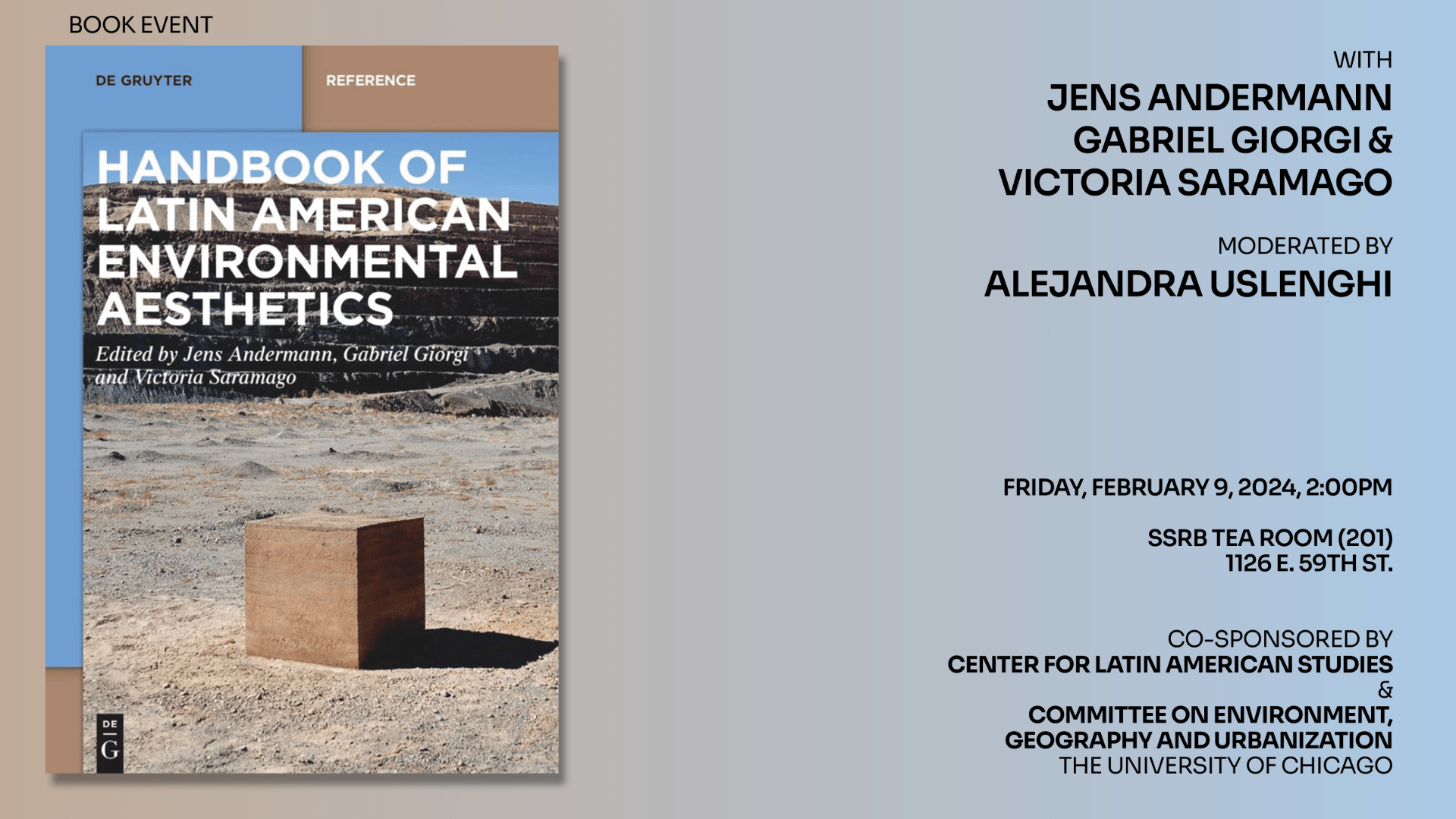
Co-sponsored Event
with editors
Jens Andermann
Gabriel Giorgi &
Victoria Saramago
moderated by
Alejandra Uslenghi
Friday, February 9, 2024, 2:00pm
SSRB Tea Room (201)
1126 E. 59th St.
More Info
The Handbook of Latin American Environmental Aesthetics↗ offers a comprehensive overview of Latin American aesthetic and conceptual production addressing the more-than-human environment at the intersection between art, activism, and critique. Fields include literature, performance, film, and other audiovisual media as well as their interactions with community activisms. Scholars who have helped establish environmental approaches in the field as well as emergent critical voices revisit key concepts such as ecocriticism, (post-)extractivism, and multinaturalism, while opening new avenues of dialogue with areas including critical race theory and ethnicity, energy humanities, queer-*trans studies, and infrastructure studies, among others. This volume both traces these genealogies and maps out key positions in this increasingly central field of Latin Americanism, at the same time as they relate it to the environmental humanities at large.
By showing how artistic and literary productions illuminate critical zones of environmental thought, articulating urgent social and material issues with cultural archives, historical approaches and conceptual interventions, this volume offers cutting-edge critical tools for approaching literature and the arts from new angles that call into question the nature/culture boundary.
CEGU Colloquium
Pauline Goul, Romance Languages & Literatures + CEGU
Friday, February 9, 2024
12:30pm CT
Mansueto Lounge, 1155 E. 60th St.
More Info
This chapter provides a new reading of the intricate relationship between Montaigne’s two essays on the New World, “Of Cannibals” and “Of Coaches”, arguing that their affective grounding allowed Montaigne to formulate an anti-colonial, ecological critique of the conquest. From an attention to environmental change in “Of Cannibals” that reveals a critique of expansionism centered on one plagiarized anecdote, to a carefully constructed lexicon of sustainability throughout both essays that reflects on the risks of overloading nature and on limits, I argue that, ultimately, both essays denounce colonization as a movement of subjugation and violence. Montaigne exposes how, by confusing human beings and nonhuman environment as resources, Europeans have rendered themselves insensitive to their responsibility in processes of devastation that have only grown larger to this day.
Student Event
Wednesday, February 7, 2024
5:00pm
Urban Lounge, 1155 E. 60th St.
Student Event
Organized by Alexander Arroyo & Mary Beth Pudup
Thursday, February 1, 2024, 4:00–5:00pm
Urban Lounge, 1155 E. 60th St.
More Info
On November 30th, 2023, the United Arab Emirates convened the 28th Conference of the Parties of the United Nations Framework Convention on Climate Change—COP28 for short—in Dubai. Over the course of two weeks, negotiators from almost 200 nations took stock of progress made since the 2015 Paris Agreement—too slow, and not enough—and debated ways to transition away from fossil fuels—a debate influenced, no doubt, by the overwhelming presence of fossil fuel industry lobbyists and their political allies. Despite strenuous disagreement between delegates and scathing critique from activists, in his closing remarks on December 13th UN Climate Change Executive Secretary Simon Stiell proclaimed that COP28 signalled the “beginning of the end” of the fossil fuel era.
But amidst such mixed messages emerging from COP, are there other signals in the noise? What really happened offstage? What were activists and other unsanctioned participants demanding, and why? Are carbon markets and other market-based technofixes the only answer? What can we learn from COP28 from the bottom-up? Come join students from UChicago’s COP28 delegation and Professor Berit Kristofferson (UiT, Norway) to get an inside story on the politics of climate change and discuss the way forward.
Student Event
Saturday, January 27, 2024
Transportation Provided from 1155 E. 60th St.
CEGU Colloquium
Chaos in the Heavens: The Forgotton History of Climate Change, 15th–20th Centuries
Jean-Baptiste Fressoz, Centre National de la Recherche Scientifique (CNRS), Paris
Friday, January 26, 2024
12:30pm CT
Mansueto Lounge, 1155 E. 60th St.
More Info
Nothing could seem more contemporary than climate change. Yet, in Chaos in the Heavens (Verso, 2024), Jean-Baptiste Fressoz and Fabien Locher show that we have been thinking about and debating the consequences of our actions upon the environment for centuries. The subject was raised wherever history accelerated: by the Conquistadors in the New World, by the French revolutionaries of 1789, by the scientists and politicians of the nineteenth century, by the European imperialists in Asian and Africa until the Second World War. Climate change was at the heart of fundamental debates about colonization, God, the state, nature, and capitalism. From these intellectual and political battles emerged key concepts of contemporary environmental science and policy. For a brief interlude, science and industry instilled in us the reassuring illusion of an impassive climate. But, in the age of global warming, we must, once again, confront the chaos in the heavens.
Jean-Baptiste Fressoz is a historian at the CNRS in Paris. He is the author of Happy Apocalypse. A history of technological risk; The Shock of the Anthropocene (with C. Bonneuil); Chaos in the heavens (with Fabien Locher) and Sans transition. Une nouvelle histoire de l’énergie.
CEGU Event
Saadia Mirza, American University in Paris & University of Chicago
Alberto Ortega Trejo, School of the Art Institute of Chicago & University of Chicago
Joshi Radin, Chicago-based Artist/Writer
Alexander Arroyo, University of Chicago (moderator)
Jessica Landau, University of Chicago (introduction)
Thursday, January 25, 2024
6:00–7:30pm
Smart Museum of Art, 5550 S. Greenwood Ave.
More Info
Individual and collective experiences of climate change are mediated simultaneously by embodied encounters with extreme weather events and by now-familiar abstractions of climate models and satellite imagery. As we grapple with the increasing dissonance between everyday life and epochal climatic and environmental change, how might we hold these intimate and remote forms of sensing in generative tension? How might we learn from the space between what we can touch, smell, see, or hear and what we can observe or study from afar? This event explores how the prescient work of sculptor Ruth Duckworth might guide us through that space, offering insight and inspiration for ways of knowing climate and its many forms of change through embodied aesthetic practice. In so doing, Duckworth points toward new forms of climate media attuned to the multiple scales of transformation– climatic, environmental, social, bodily– to which we must so urgently attend.
Join us for a conversation with UChicago faculty and distinguished guests, sponsored by the Committee on Environment, Geography, and Urbanization (CEGU) and the Smart Museum of Art’s Feitler Center for Academic Inquiry.
Student Event
Friday, January 19, 2024
12:00–3:00pm
Cloister Club, Ida Noyes Hall
1212 E. 59th St.
More Info
Energize is The University of Chicago’s largest annual networking event for undergraduate students interested in energy and the environment.
10+ employer partners from renewable energy to local non-profits will be joining us for fireside conversations, small group coffee chats, and an open, ‘career fair’ networking event. This will be your top chance in the 2023-2024 academic year to learn about internship opportunities, meet alumni working in the environmental and energy fields, and discuss full-time opportunities.
Participating Partners
- 174 Power Global
- Argonne National Laboratory
- Acciona
- Comed/Exelon
- Field Museum
- LanzaTech
- Marathon Capital
- Metropolitan Water Reclamation District of Greater Chicago
- New Energy Nexus
- The Nature Conservancy
- Urban Rivers
- Valor Infrastructure Partners
Student Event
Wednesday, January 17, 2024
4:00–5:30pm
Urban Lounge, 1155 E. 60th St.
More Info
Join us for a BA Thesis Alumni Panel to hear directly from recent grads about tackling the thesis process and transitioning to the professional world after college. Alumni will share insights on research, writing strategies, and overcoming common hurdles related to methodologies and data collection. They'll also discuss their career paths since graduation. This is a great chance to get personalized advice and ask questions as you progress through your own thesis and post-graduation journey. Food will be provided!
Panelists
- Ruby Rorty, “Is There a Legal Path to Environmental Justice? Movement-Building, Strategic Litigation, and a Case Study of Chicago’s General Iron Dispute.”
- Kimika Padilla, “Bird’s Eye View: Local Perspective from a Case Study of Aerial Cable Cars in Bogotá, Colombia.”
- Micah Wilcox, “Major ‘L’: How the Chicago Transit Authority Gentrified Its Elevated Trains.”
Student Event
Tuesday, January 16, 2024
6:00–7:15pm
Assembly Hall, International House
1414 E. 59th St.
More Info
In December, the Energy Policy Institute at The University of Chicago (EPIC) and The University of Chicago Office of Career Advancement sponsored student delegates from the College, Booth, Harris, and Law School to attend the COP28 international climate change conferencein Dubai.
Join us for an in-depth conversation about COP, the issues, the experiences of our students, and the role you can play as a climate champion.
Persons with disabilities who may need assistance should contact International House in advance of the program at (773) 753-2274 or i-house-programs@uchicago.edu
Frizzell Learning & Speaker Series
Friday, January 5, 2024
4:00pm CT
Urban Lounge, 1155 E. 60th St.
More Info
The summer of 2023 was the hottest ever recorded on planet earth and—wait for it—next summer is expected to be hotter. Seemingly every extreme weather event—be it wildfires, flooding, or heat emergencies—is greeted as the “new normal” instead of what it should be: a clarion call for collective study and action. This event takes up that challenge and creates a CEGU forum for student-driven conversations that grapple with the climate and nature emergency as it is happening. This is an invitation to talk about root causes of the emergency, map efforts underway to address those causes and finally and urgently, imagine alternative futures.
The event will begin with a brief introduction by CEGU faculty + students and will move on to an open discussion and brainstorm about what kinds of student-led CEGU initiatives and events we can develop to address the climate-nature emergency. Come ready to share ideas and get inspired! Snacks and drinks will be provided.
This event is part of the Frizzell Family Learning & Speaker Series.
Student Event
Friday, December 1, 2023
4:30pm CT
Mansueto Lounge, 1155 E. 60th St.
More Info
Join organizers and authors of CEGU's Exposions Magazine for the launch of a special issue in collaboration with the Chicago Studies research project, Century on 55th Street. Hear from contributors, meet the team, pick up a copy, and enjoy some refreshments.
CEGU Event, CEGU Colloquium
The WAstemen's fossil flora: geology and labor in britain's energy transition , 1819-1845
Fredrik Albritton Jonsson, History & CEGU
Benjamin Morgan, English & CEGU (discussant)
Friday, November 17, 2023
12:00–2:00pm CT
SSRB Tea Room, 1126 E. 59th St.
More Info
The deep coal mine was the work site of Carboniferous geology. The richest evidence came not from the coal seams themselves but the shale layers that surrounded them. This meant that fossils came to light principally when tunnels collapsed. Fossil collection in the colliery was a high-risk activity associated with maintenance, repair, and danger to life and limb. The key figure in such work was the wasteman. The task of the wasteman was to walk the pits to survey the air courses and keep them in good repair. The wastemen also took stock of the stability of pillars and old workings. Sigillaria fossils posed a particular risk to colliers. Their heavy trunks frequently slipped out of the roof, leaving gaping holes, sometimes as wide as five feet in diameter. Constant surveillance of waste and shale was thus a critical task, vital to the security of the colliery and the lives of the people there. Yet references to the work of the wasteman are very rare in geological texts from the period. In natural theology, the divine work of the Creator took precedence and erased the social world of the collier. Fossils were seen as emblems of providential time, not products of the wasteman’s working day. Sigillaria and other coal plants had purged the atmosphere of surplus carbonic acid and deposited it in the Carboniferous strata. Thanks to the accumulation of carbon in the underground, the atmosphere of the planet had become “fit for the support of animal life, and human habitation.” Coal was not just the fuel of British wealth but also the life-giving force that had made the planet habitable. The erasure of the colliery worker from geology paved the way for a cosmology of carbon. At the same time as mining engineers and wastemen traced the gas flows inside the coalmine, geologists began to imagine God as the wasteman of the carbon cycle, regulating the atmosphere, channeling carbon back and forth through plants, earth, and air.
Student Event
Nina Olney, Graduate Student Research Mentor, CEGU
Monday, November 13, 2023
4:00–5:00pm CT
Room 129, 1155 E. 60th St.
More Info
Are you a 4th year thesis or capstone writer interested in using your project to explore a future career? Are you a 3rd year student thinking about the thesis and capstone options? In this workshop, we will discuss how to tailor your BA thesis or capstone to post-graduation pathways related to cities and the environment. While the BA thesis should stand on its own in terms of research and design, it may be useful to orient your paper towards various careers, especially those that might require or allow for the submission of a writing sample. Over the course of an hour, we’ll discuss how to select sources, methods, and visualizations that signal to a given audience your understanding of the field—whether it be urban planning, academic research, policy, consulting, or beyond. The goal will be to identify a strong audience and build some next steps towards putting your thesis or capstone paper in conversation with these careers.
CEGU Colloquium, Student Event
Friday, November 10, 2023
2:00–3:00pm CT
Room 344, 1155 E. 60th St.
More Info
All those currently seeking to earn a CEGU Doctoral Certificate are obliged to attend. Anyone interested in the CEGU Doctoral Certificate are welcome. Attendance in person is preferred, but if you are unable to attend in person, the meeting will be also available via Zoom. You will receive a link upon submitting the registration form.
Student Event
NIGHT AT THE (SMART) MUSEUM
Thursday, November 9, 2023
6:00–7:30pm CT
Smart Museum of Art
(5550 S Greenwood Ave)
More Info
CEGU students, faculty, and friends are invited for a night at the museum to discover and engage the work of Ruth Duckworth in the Smart Museum’s exhibition Ruth Duckworth: Life As A Unity.
This is a social event for students and faculty across the University from CEGU to the arts and humanities to the physical and biological sciences to mingle, exchange ideas, and get to know each other as well as one of UChicago’s most influential faculty artists, Ruth Duckworth, who was deeply embedded in the Department of Geophysical Sciences and Hyde Park’s burgeoning climate activist community in the 1960s.
Co-sponsored Event
Revisiting Data center energy-use estimates
Wednesday, November 8, 2023
3:00–4:00pm CT
Room 298, John Crerar Library
(5730 S Ellis Ave)
More Info
Information and communication technology (ICT) is already pervasive in virtually all aspects of everyday life and recent wide-scale availability of AI portends an accelerated reliance on a more digitalized world. Data centers are the backbone of ICT and concern about the energy-intensive equipment within these buildings has led to many legitimate concerns - along with sensational claims - over the environmental implications of a society increasingly reliant on data-intensive services.
This presentation will compare these oft-cited claims against previous Berkeley Lab research, which have historically shown much more modest growth in energy use owing to strong energy-efficiency trends, and present current research around emerging computing trends that require rethinking current sustainability efforts. The presentation will highlight decarbonization opportunities of the ICT industry as well as how ICT can be used to decarbonize other sectors.
CEGU Event, CEGU Colloquium
Megan Black, MIT
Elizabeth Chatterjee, University of Chicago (discussant)
Friday, October 27, 2023
12:00–1:30pm CT
Room 142, 1155 E. 60th St.
More Info
The talk will examine how Friends of the Earth helped make Crested Butte, Colorado's fight against the multinational mining firm AMAX a household name in the 1970s (while neglecting to provide the same level of dug-in support to other communities that, unlike this town, were not inhabited by a nature-seeking group of white elites), asking about the possibilities and limitations of multiscalar activism seeking to move from local to global.
This event is co-sponsored by International House. Please note, this event will take place in person only. A recording will be made available shortly afterwards.
Student Event
IRB Thesis Workshop
Led by Christopher Kindell
Wednesday, October 25, 2023
5:00–6:00pm CT
Room 129, 1155 E. 60th St.
Student Event
CEGU Open House
Wednesday, October 25, 2023
4:00–5:00pm CT
Urban Lounge, 1155 E. 60th St.
CEGU Colloquium
Elaine Colligan, Ph.D. Student in Political Science
Friday, October 20, 2023
12:00–2:00pm CT
Room 142, 1155 E. 60th St.
More Info
In a moment of world-destroying environmental breakdown, political actors are increasingly claiming that nature should have rights. What are the political stakes of these claims? Against their scholarly critics, who contend that extending rights to nature is a philosophically incoherent idea and thus politically ineffective, I contend that when political actors claim that nature should have rights, they are not attempting to extend rights to a new class of subjects but potentially transforming the concept of rights. This is not to say that nature simply can have rights; I agree that nature’s rights encounter “conceptual strain," both hold that this does not entail that nature’s rights could never “make sense.” If we understand nature’s rights not as a pre-linguistic and pre-political concept, but rather as an everyday practice of making political claims, we can see how these performative acts of democratic persuasion might make sense anew. Innovating at the fuzzy boundary between the rule-bound and radically open character of language, claims that nature should have rights defamiliarize the grammar of both rights and nature.
Co-sponsored Event, CEGU Colloquium
Sarah Newman, Claudia Brittenham, Pauline Goul, and Mariana Petry Cabral
Wednesday, October 11, 2023
5:00pm CT
Assembly Hall, International House (1414 E. 59th St.)
More Info
Garbage is often assumed to be an inevitable part and problem of human existence. But when did people actually come to think of things as “trash”—as becoming worthless over time or through use, as having an end?
Unmaking Waste tackles these questions through a long-term, cross-cultural approach. Drawing on archaeological finds, historical documents, and ethnographic observations to examine Europe, the United States, and Central America from prehistory to the present, Sarah Newman traces how different ideas about waste took shape in different times and places. Newman examines what people consider to be “waste” and how they interact with it, as well as what happens when different perceptions of trash come into conflict. Conceptions of waste have shaped forms of reuse and renewal in ancient Mesoamerica, early modern ideas of civility and forced religious conversion in New Spain, and even the modern discipline of archaeology. Newman argues that centuries of assumptions imposed on other places, times, and peoples need to be rethought. This book is not only a broad reconsideration of waste; it is also a call for new forms of archaeology that do not take garbage for granted. Unmaking Waste reveals that waste is not—and never has been—an obvious or universal concept.
Please join CEGU, the Center for International Social Science Research (CISSR), and the Center for Latin American Studies (CLAS) for a roundtable discussion and reception with the author at International House.
Student Event
Wednesday, October 11, 2023
1:00–3:00pm CT
Social Sciences Quad
Student Event
Friday, September 29, 2023
10:00am–2:00pm CT
Meet in the North Courtyard at 1155 E. 60th St.
More Info
Happy Autumn Quarter! Join us in celebrating the beginning of the academic year with our Fall social event, hiking at the Indiana Dunes. Led by UChicago Alum and President of the Chicago Ornithological Society, Edward Warden, this hike will explore the many ecosystems of the Indiana Dunes including dunes, oak savannas, swamps, marshes, and forests.
We will meet in the outdoor courtyard in front of the 1155 building, located at 1155 E. 60th Street. Our bus will leave promptly at 10:00am, so be sure to be on time!
Participants are expected to wear appropriate clothing for hiking outdoors, preferably long pants and close-toed shoes. Please bring a water bottle and preferred snacks, granola bars and other light refreshments will be provided.
Please contact Tess Conway, student affairs administrator, at tconway@uchicago.edu with any questions.
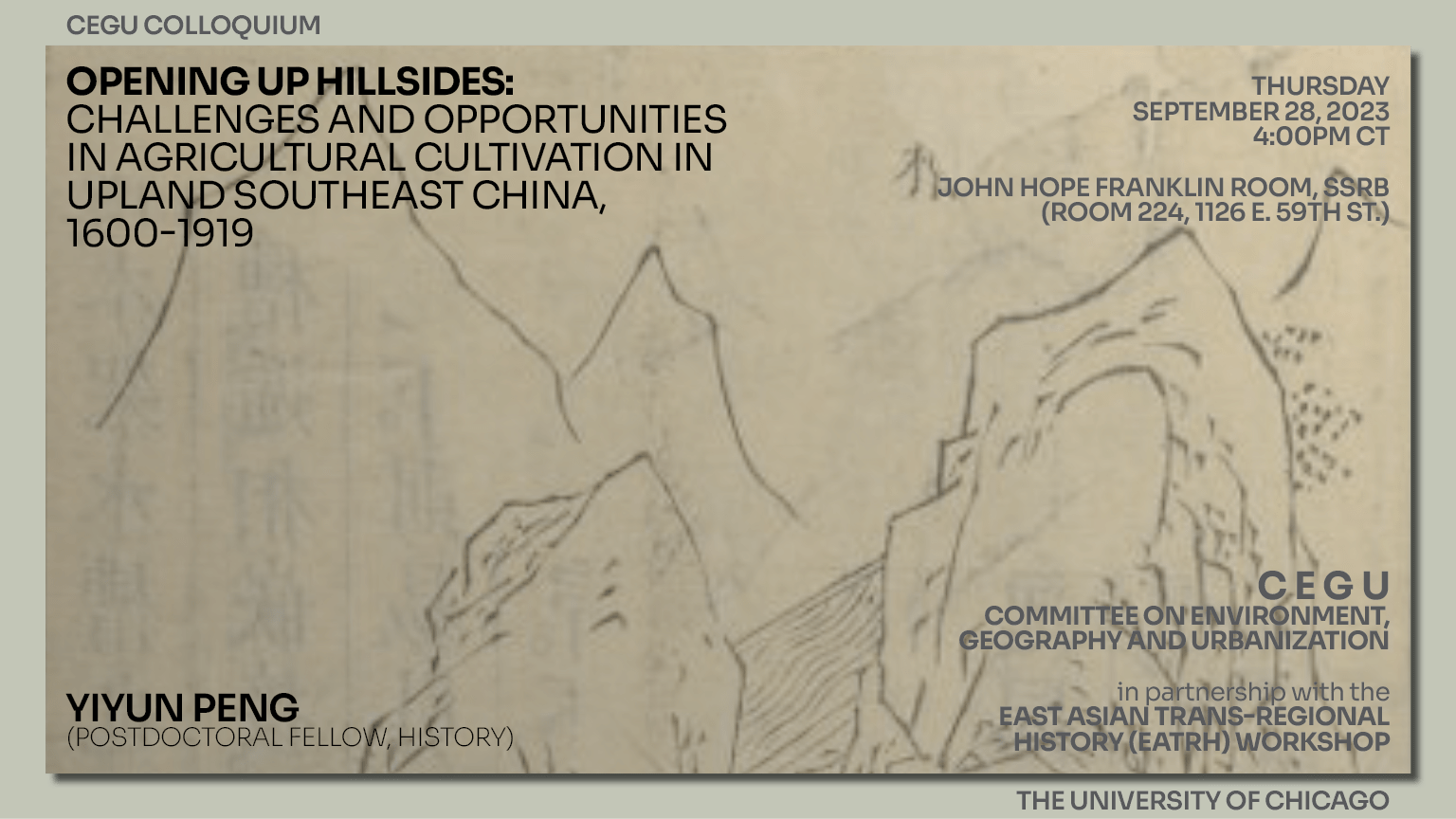
CEGU Colloquium
Yiyun Peng, Postdoctoral Fellow in History
Thursday, September 28, 2023
4:00pm CT
John Hope Franklin Room, SSRB
(Room 224, 1126 E. 59th St.)
More Info
How did uplands, often presumed inhospitable to agriculture, set limits to and provide opportunities for the cultivation of crops? How did mountain people address the difficulties and utilize and shape the upland environment when cultivating hill- and mountainsides? This article goes beyond two lines of well-established scholarship on upland cultivation in general: one that focuses on typically mountain businesses including lumbering, mining, and hunting; the other on environmental degradation as the result of agricultural cultivation. Instead, by focusing on aspects such as infertility, limited water supply, cold temperature, and elevation in late imperial upland Southeast China, this article discusses the ways in which the agricultural cultivators made efforts to deal with the unforgiving environment. It also reveals how the cultivators utilized various seemingly adverse elements in the uplands, such as cliffs and shadowed space, to their advantage.
By the sixteenth century, most of the fertile bottomland in the valleys and basins and some of the easily accessible hillsides in upland Southeast China had been cultivated into paddy fields. Thereafter, against the context of rapid population growth, a large number of people sojourned in this region and went to great lengths to cultivate deep mountains with food and cash crops, including indigo, tobacco, and New World food crops. Through a close examination of the materiality of mountains and the technicality of mountain people’s cultivation activities, this article contributes to a better understanding of making a living in this complex environment through agriculture.
Yiyun Peng received her PhD in history from Cornell University in August 2023 and joined the Department of History at UChicago after graduation as a postdoctoral fellow. She is mainly interested in environmental history, the history of technology, and economic history. While her main focus is on China, she has also been doing research on Southeast Asia, in particular the Malay world. Her dissertation works on a few cash crops and the handicraft industries processing them into commodities—indigo dye, bamboo paper, tobacco, and ramie (a fiber plant) cloth—led to a herbaceous revolution in upland Southeast China from the sixteenth to the mid-twentieth century, which profoundly transformed the region’s environment and society. The dissertation is a winner of the Messenger Chalmers Prize for the best dissertation in the Department of History at Cornell University.
Student Event
Academic Opportunities Fair
Wednesday, September 27, 2023
3:30–6:30pm CT
Main Quad
EVENTS: 2022–23
Student Event
BA Thesis and Capstone Symposium
Tuesday, May 23, 2023
9:00am–4:30pm CT
Room 142, 1155 E. 60th St
CEGU Event
Fredrik Albritton Jonsson, The University of Chicago
Carl Wennerlind, Barnard College
Dipesh Chakrabarty, University of Chicago (moderator)
Thursday, May 18, 2023
5:00pm-6:30pm CT
John Hope Franklin Room, Social Sciences Research Building 224
More Info
"Our book offers a new interpretation of the idea of scarcity in economic thought. We explain how modern economics arrived at its influential axiom of scarcity - infinite wants in a finite world - and also why this peculiar definition has no claim to universal validity. There are many other ways of imagining the relation between nature and the economy. We demonstrate the historical contingency of neoclassical scarcity by reconstructing the intellectual and environmental context of a dozen alternative conceptions of scarcity across 500 years of European thought. Our book ends with a plea for a new kind of economics oriented towards ecological repair rather than infinite growth."
This event is co-organized by the Center for International Social Science Research (CISSR) and the Committee on Environment, Geography and Urbanization (CEGU).
Co-sponsored Event
Organized by Victoria Saramago and Eduardo Leão
May 17–18, 2023
Franke Institute for the Humanities, Regenstein Library (1100 E. 57th St.)
More Info
This conference aims to bring to campus scholars conducting cutting-edge research on the Amazonian region in the United States today. Our purpose is to present scholars from a range of fields in the Humanities and Social Sciences in order to provide to the university’s academic community a panorama of the questions, themes, and problems that have been guiding current scholarship and cultural production on the Amazon. How is the region’s history, from the late-nineteenth-century rubber boom to the expanding deforestation of the 1970s, present in contemporary inquiries? What is the role of Indigenous thought and cultural production, including visual arts as well as film and verbal arts, in today’s Amazonian and international cultural scenes? How has the Amazon become a fertile ground for the production of speculative fiction? In a region where Indigenous presence has received so much attention, how to account for the large and vibrant presence of Black and other brown populations?
This event is co-sponsored by CEGU, the Center for Latin American Studies, the Department of Romance Languages and Literatures, and the Franke Institute for the Humanities.
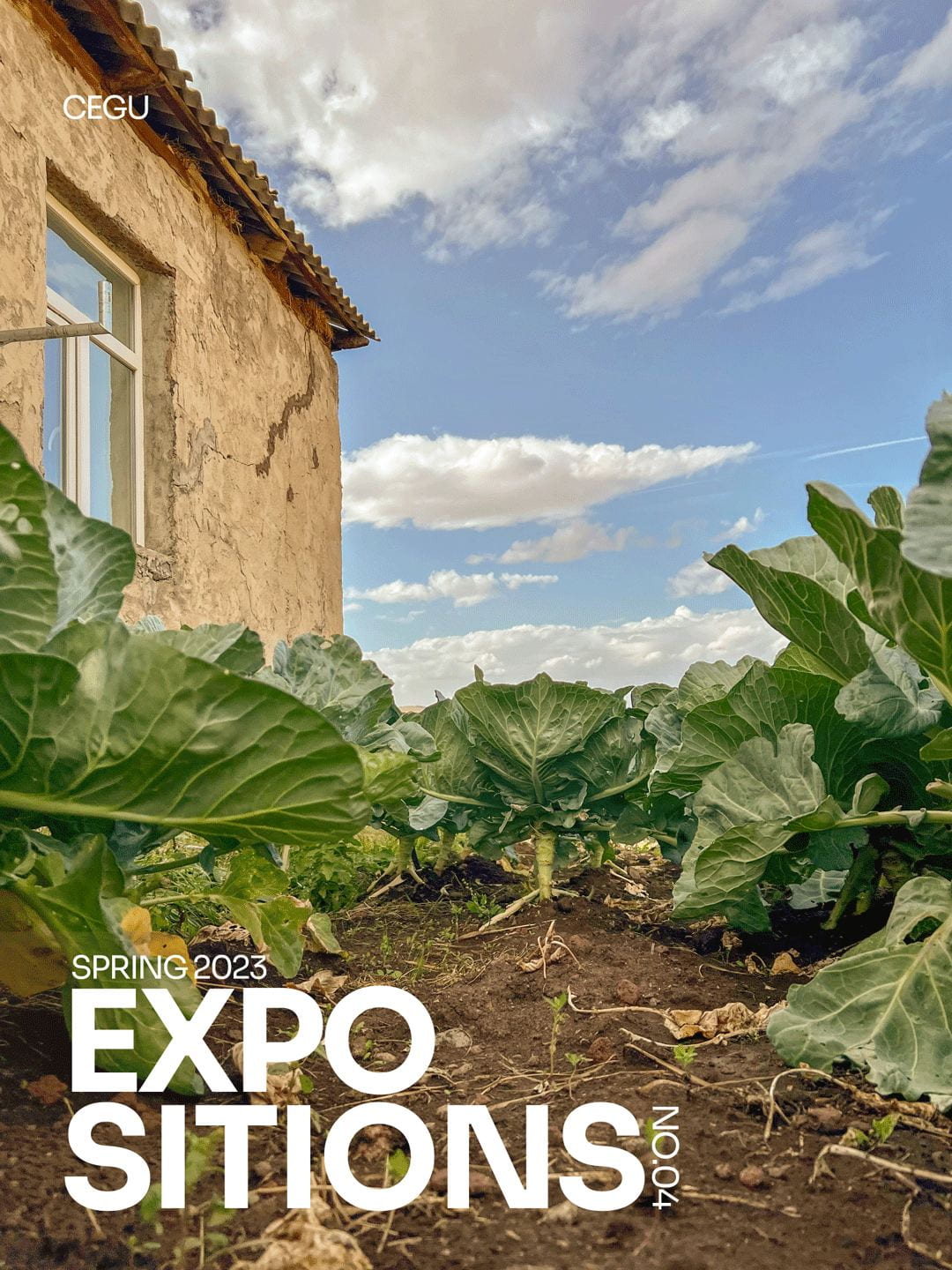
Student Event
Expositions Magazine: Issue No. 4 Launch Party
Friday, May 12, 2023
4:30–5:45pm CT
Urban Lounge, 1155 E. 60th St
More Info
Expositions Magazine, CEGU’s student publication, is hosting a launch party to celebrate the release of our latest issue on Friday, May 12. Join us in the Urban Lounge to meet and hear from the talented students who contributed to Issue No. 4! If Chicago bike lane inequities, the daily lives of Las Vegans, or the hidden spaces of Hyde Park sound intriguing to you, come join us.
Student Event
Grassroots Organizing between Housing and Environmental Justice
Antonio Gutierrez, Autonomous Tenants Union
Wednesday, May 10, 2023
1:30–2:30pm CT
Urban Lounge, 1155 E. 60th St
More Info
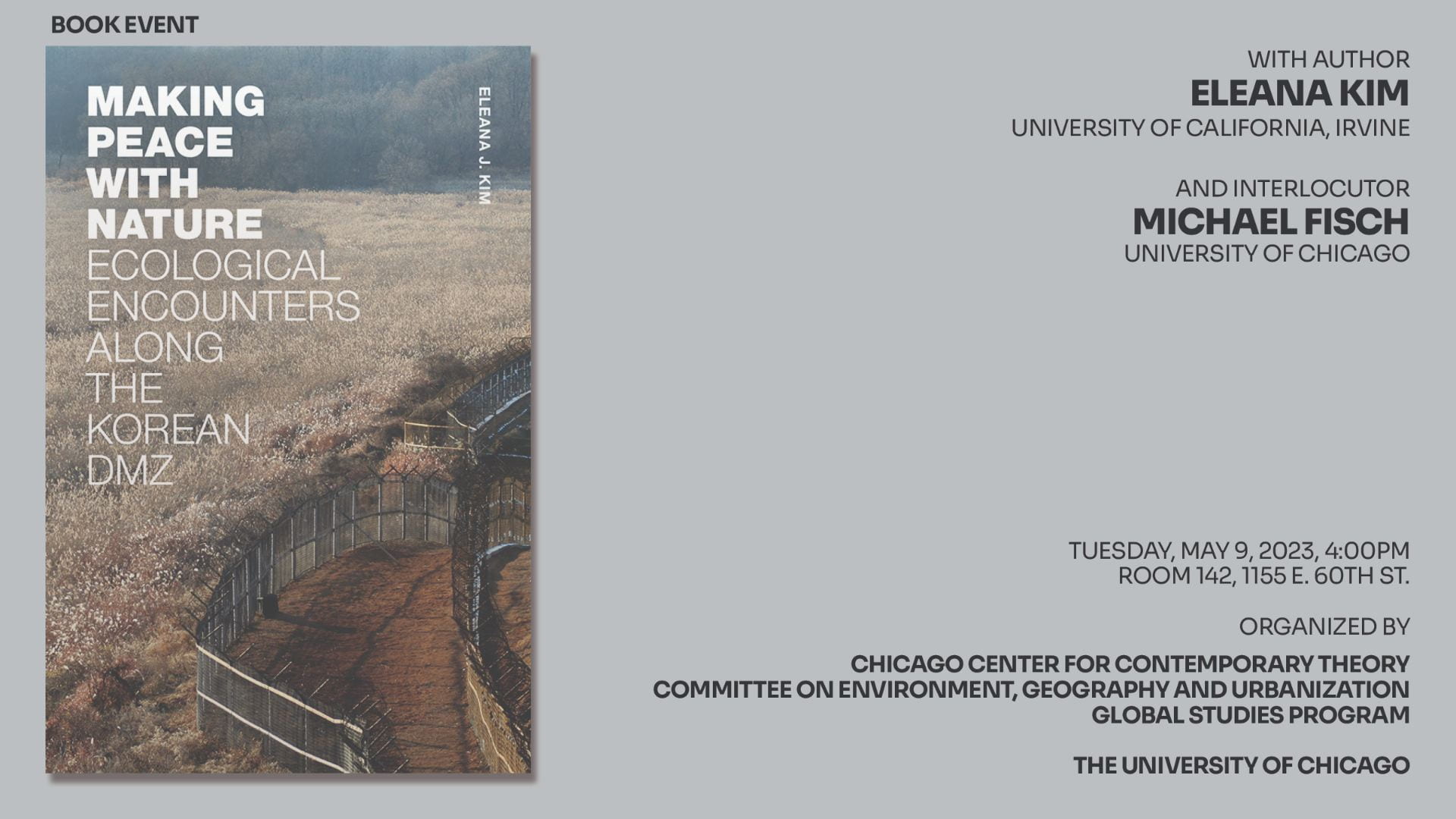
Book Event
Eleana Kim, University of California, Irvine
Michael Fisch, University of Chicago (interlocutor)
Tuesday, May 9, 2023
4:00pm CT
Room 142, 1155 E. 60th St.
More Info
This book talk discusses Eleana Kim’s recently published ethnography of the ecologies of the South Korean borderlands, in areas adjacent the Korean Demilitarized Zone. Based on fieldwork with ecologists, environmentalists, and residents who live along the border, this book reframes the Korean DMZ and the national division around more-than-human peace. It also argues that militarized ecologies deserve greater attention in the context of climate crisis and the convergence of militarization and privatization at a planetary scale.
Eleana Kim is a sociocultural anthropologist and professor of anthropology and Asian American Studies at University of California, Irvine. She is the author of Making Peace with Nature: Ecological Encounters along the Korean DMZ (2022) and Adopted Territory: Transnational Korean Adoptees and the Politics of Belonging (2010), both published by Duke University Press. She currently serves as the president of the Society for Cultural Anthropology.
Co-sponsored Event
2023 Annual Weissbourd Conference
Friday, May 5, 2023
9:30am–5:15pm
Third Floor Lecture Hall, Swift Hall (1025 E. 58th St.)
More Info
The 2023 Weissbourd Annual Conference will explore questions of value, as well as practical and normative issues, concerning human communities' relationship with the environment and other animals in it.
CEGU Book Event
Kristin Ross
Thursday, May 4, 2023
5:00pm–6:30pm CT
Room 344, 1155 E. 60th St.
CEGU Book Event
Michael Kimmelman, New York Times
Evan Carver, University of Chicago (interlocutor)
Tuesday, May 2, 2023
6:00pm-7:00pm CT
Seminary Co-op Bookstore (5751 S. Woodlawn Ave.)
More Info
“The Intimate City is a joyful miscellany of people seeing things in the urban landscape, the streets alive with remembrances and ideas even when those streets are relatively empty of people.”—Robert Sullivan, New York Times Book Review
As New York came to a halt with COVID, Kimmelman composed an email to a group of architects, historians, writers, and friends, inviting them to take a walk. Wherever they liked, he wrote—preferably someplace meaningful to them, someplace that illuminated the city and what they loved about it. At first, the goal was distraction. At a scary moment when everything seemed uncertain, walking around New York served as a reminder of all the ways the city was still a rock, joy, and inspiration. What began with a lighthearted trip to explore Broadway’s shuttered theater district and a stroll along Museum Mile when the museums were closed soon took on a much larger meaning and ambition. These intimate, funny, richly detailed conversations between Kimmelman and his companions became anchors for millions of Times readers during the pandemic. The walks unpacked the essence of urban life and its social fabric—the history, plans, laws, feats of structural engineering, architectural highlights, and everyday realities that make up a place Kimmelman calls “humanity’s greatest achievement.”
Filled with stunning photographs documenting the city during the era of COVID, The Intimate City is the ultimate insider’s guide. The book includes new walks through LGBTQ Greenwich Village, through Forest Hills, Queens, and Mott Haven, in the Bronx. All the walks can be walked, or just be read for pleasure, by know-it-all New Yorkers or anyone else. They take readers back to an age when Times Square was still a beaver pond and Yankee Stadium a salt marsh; across the Brooklyn Bridge, for green tea ice cream in Chinatown, for momos and samosas in Jackson Heights, to explore historic Black churches in Harlem and midcentury Mad Men skyscrapers on Park Avenue. A kaleidoscopic portrait of an enduring metropolis, The Intimate City reveals why New York, despite COVID and a long history of other calamities, continues to inspire and to mean so much to those who call it home and to countless others.
Michael Kimmelman is the architecture critic of The New York Times. He has reported from more than 40 countries, was previously The Times's chief art critic and, based in Berlin, created the Abroad column, covering cultural and political affairs across Europe and the Middle East. Twice a Pulitzer Prize finalist, he is the founder and editor-at-large of a new venture focused on global challenges and progress called Headway.
Frizzell Learning & Speaker Series
Michael Kimmelman, New York Times
Nootan Bharani, University of Chicago, Arts + Public Life (interlocutor)
Monday, May 1, 2023
4:30pm-6:00pm CT
The Theatre, Ida Noyes Hall (1212 E. 59th St., Third Floor)
More Info
When climate change, aging infrastructure and an affordable housing crisis pose existential threats to our cities and society, why has it become so difficult to get big things done? Are some of the very rules and regulations put in place to solve these sorts of problems getting in the way? A look at the troubled aftermath of Hurricane Sandy in New York City, at some of the obstacles to addressing homelessness, and at some challenges to the construction of subsidized housing around the country.
Michael Kimmelman is the architecture critic of The New York Times. He has reported from more than 40 countries, was previously The Times's chief art critic and, based in Berlin, created the Abroad column, covering cultural and political affairs across Europe and the Middle East. Twice a Pulitzer Prize finalist, he is the founder and editor-at-large of a new venture focused on global challenges and progress called Headway.
Inaugural CEGU Conference
Calvin & Freda Redekop Lecture in Environment and Society By
Holly Jean Buck
Panels Featuring
Max Ajl, Hillary Angelo, Helen Anne Curry, Billy Fleming, Vinay Gidwani, Pauline Goul, Jo Guldi, Ihnji Jon, Josh Lepawsky, Shannon Mattern, Ivette Perfecto, and Xiaowei R. Wang
Moderated by CEGU Faculty
Alexander Arroyo, Grga Bašić, Neil Brenner, Elizabeth Chatterjee, Gary Herrigel, Catherine Kearns, and Sabina Shaikh
April 20–21, 2023
Room 122, Regenstein Library (1100 E. 57th St.)
Student Event
Third-year BA Thesis Workshop with CEGU Research Mentors
Wednesday, April 19, 2023
5:00pm CT
Room 129, 1155 E. 60th St
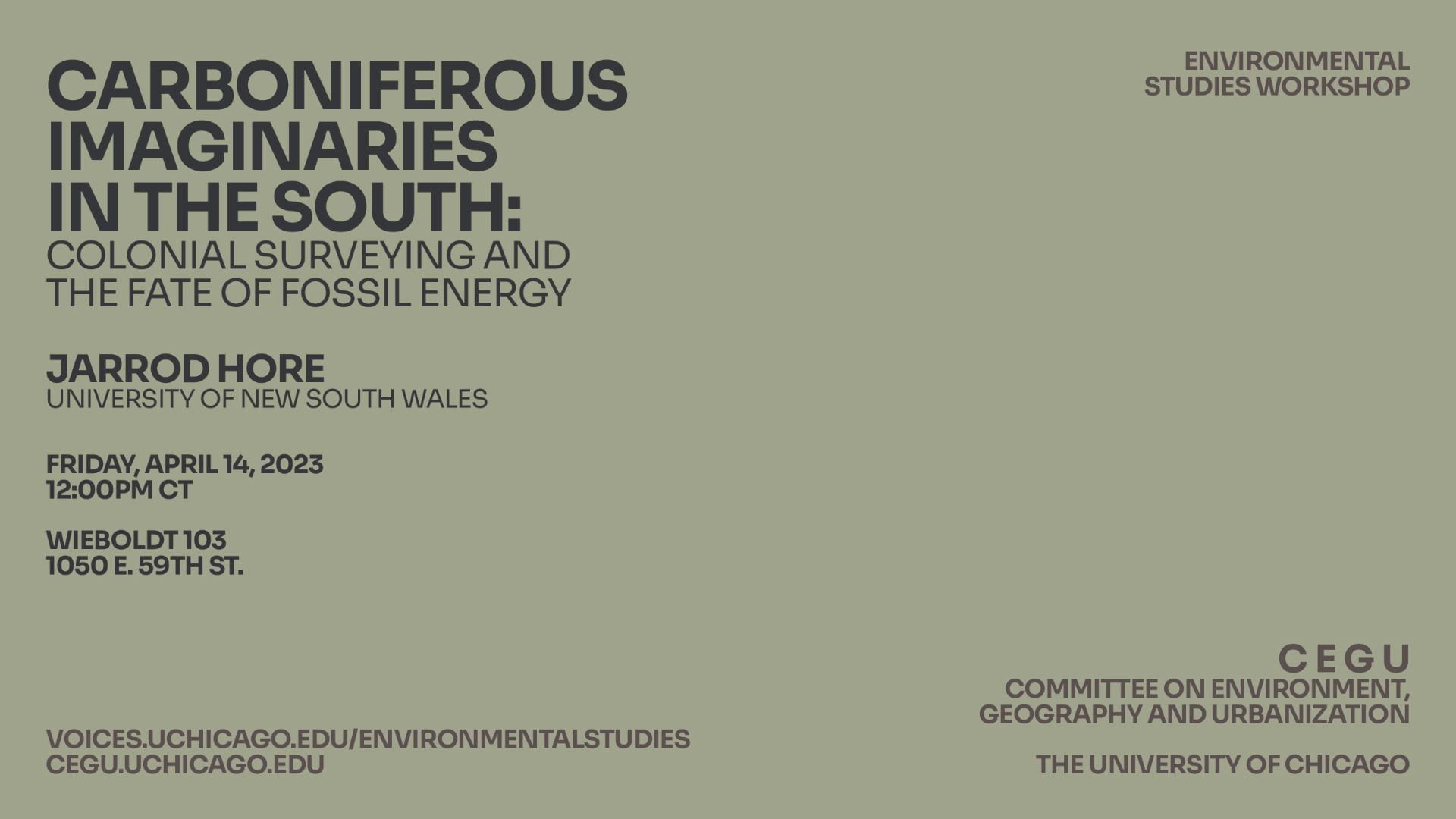
Environmental Studies Workshop
Carboniferous Imaginaries in the South: Colonial Surveying and the Fate of Fossil Energy
Friday, April 14, 2023
12:00pm CT
Room 103, Wieboldt Hall
1050 E. 59th St.
More Info
Geoscientists now routinely examine the movement of continental blocks over deep time to glean information about the possible location of valuable resources. This practice was initially developed and perfected in the nineteenth century through engagements with fossil deposits – coal, gas, and petroleum reserves – and scaled up to global proportions by surveyors working in the southern hemisphere. In this period geologists identified conformities that link fossil fuels in the Paraná basin in Brazil to the Bowen basin of Queensland, through the Karoo basin of South Africa and the original Gondwana coal measures of India. Defined by the distinguishable Glossopteris fossil leaf, southern coal deposits are an energy network in deep time, latterly reinvented as a resource for imperialism, colonialism, and modernization from the nineteenth century.
This paper examines how these resources were conceived during this initial moment of reinvention and begins to map the uses to which they were put. Starting in the late nineteenth century, when colonial geological surveys first began to quantify the extent and value of these southern hemisphere coal basins, the paper explores the interests that surveyors and geologists pursued in the strata and the cultures of exploitation and extraction that developed in the wake of their study. Geologists in India, Australia, Southern Africa, and South America all worked intimately with related carboniferous stratigraphies. By the early twentieth century geologists had concluded, in the terms of Lewis Leigh Fermor (1880-1954), that the key difference between south and north was the considerable fossil energy wealth that the former presented to the latter. These geologists and their patrons in government and business therefore framed the remnants of the supercontinent of Gondwanaland as a vast energy source for various imperial projects.
During the late nineteenth century the resources of the former supercontinent energized imaginations but in the twentieth century they began to support economies. At least in its Permian permutations, ‘Gondwanaland’ came to be associated with coal, and therefore to modernity, wealth production, energy transitions, and to a modern geological south. According to a recent BP report, southern hemisphere deposits still make up about 24.4% of known reserves of high-grade anthracite. In India the Gondwana coalfields make up about 98% of remaining coal reserves. These deposits have been highly significant to industrial and economic development across the global south. By elaborating on this modern history, this paper challenges a (north) Atlantic-oriented history of fossil-fueled industrialization. An antipodean focus on Gondwanaland helps us consider the place of southern sources of fossil energy in nineteenth and twentieth-century growth trends. This offers up the possibility of a new history of fossil energy, coal, and global capitalism rooted firmly in southern geographies, temporalities, and political economies.
Jarrod Hore is a Postdoctoral Fellow at the University of New South Wales, Sydney and Co-Director of the New Earth Histories Research Group. He is a historian of environments, geologies, and photographies and the author of Visions of Nature: How Landscape Photography Shaped Settler Colonialism (University of California Press, 2022). His current project investigates the underpinnings of modern earth science in a series of geological surveys in late nineteenth century India, Australia, South Africa, Brazil, and Argentina.
Co-sponsored Conference
Keynotes
Peter Galison, Sophia Rosenfeld, Jules Gill-Peterson, and Myrna Perez Sheldon
Speakers
Ken Alder, Nima Bassiri, Etienne Benson, Meghna Chaudhuri, Terence Keel, Adam Leeds, Mary Mitchell, Amy E. Slaton, Jessica Wang, and Julie White
Organizers
Isabel Gabel, Stephanie Dick, and Marc Aidinoff
April 7–8, 2023
More Info
Science and liberalism appear to be bound more and more tightly as the crises of the present moment, from the pandemic to severe weather events, make painfully clear. This conference begins from the observation that liberalism and science have always been linked in ways that are both explicit and unspoken. At the same time that historical scholarship has laid bare the genealogies of liberalism in relation to colonialism, racism, and capitalism, science studies scholars and historians of science have revealed the many ways that science is produced and bounded by the social worlds it inhabits. In light of these critical traditions, we will bring together a diverse group of scholars to explore two related themes.
First, we will interrogate the ways “science” furnishes the liberal world with many of its key features, including for example individuality, diversity, autonomy/choice, and security. In other words, taking seriously the critical genealogies of liberalism that have emerged in recent years, we will examine the role of the sciences in that history of liberalism.
Second, we will attempt to make explicit the decidedly liberal contexts in which our fields have taken shape, with the aim of understanding how this context may have limited our collective understanding of the histories of science, technology and medicine. Our goal is to move past the idea that there is a single choice – either critique science rigorously but risk giving ammunition to illiberal forces or defend science as a part of liberal technocracy’s last gasping breaths. Both options serve liberalism. Maybe there are new ways to do critical scholarship on science.
Please visit the conference website↗ for full details.
This event is organized by the Institute on the Formation of Knowledge and co-sponsored by CEGU.
Student Event
Friday, March 31, 2023
12:00pm-1:00pm
Urban Lounge, 1155 E. 60th St.
More Info
As of Autumn 2023, the Major and Minor in Environmental and Urban Studies will become the Major and Minor in Environment, Geography and Urbanization. We invite all interested students to join us for an information session on these updated program requirements, including the opportunity for Q&A. Lunch will be provided!
Student Event
BA Capstone Production Workshop
Wednesday, March 29, 2023
5:00–6:00pm
Urban Lounge, 1155 E. 60th St.
More Info
![Arnaud Orain on Lost Economic Knowledge Flyer(1)[31] poster for February 2023 New Book Salon with Nancy Fraser, co-organized with 3CT](https://voices.uchicago.edu/cegu/files/2023/02/Arnaud-Orain-on-Lost-Economic-Knowledge-Flyer131.jpg)
![Arnaud Orain on Lost Economic Knowledge Flyer(1)[31] poster for February 2023 New Book Salon with Nancy Fraser, co-organized with 3CT](https://voices.uchicago.edu/cegu/files/2023/02/Arnaud-Orain-on-Lost-Economic-Knowledge-Flyer131.jpg)
Co-sponsored Event
Arnaud Orain, Université Paris 8
Fredrik Albritton Jonsson, University of Chicago (commentary)
Wednesday, March 1, 2023
5:00pm CT
Classics 110, 1010 E. 59th St.
More Info
An exploration of the subaltern ecologies of the Enlightenment that explores the lost world of artisanal and peasant knowledge rivaling eighteenth-century political economy and natural history. Based on the forthcoming Les savoirs perdus de l'économie: contribution à l'équilibre du vivant, Gallimard, NRF essais.
Sponsored by the Department of History and CEGU
Student Event
BA Thesis Chat and Alumni Panel
Friday, February 24, 2023
12:30–1:30pm CT
Room 129, 1155 E. 60th St.
More Info
This event is open to all UChicago undergraduates. Third- and Fourth-Year ENST majors are encouraged to attend.
Student Event
BA Thesis Brainstorm Session with CEGU Research Mentors
Wednesday, February 15, 2023
12:00pm CT
Room 129, 1155 E. 60th St.
More Info
Join CEGU research mentors and fellow students to brainstorm together about the BA Thesis in the Environmental and Urban Studies major.
This event is optional (but encouraged) for Third-Year ENST majors.
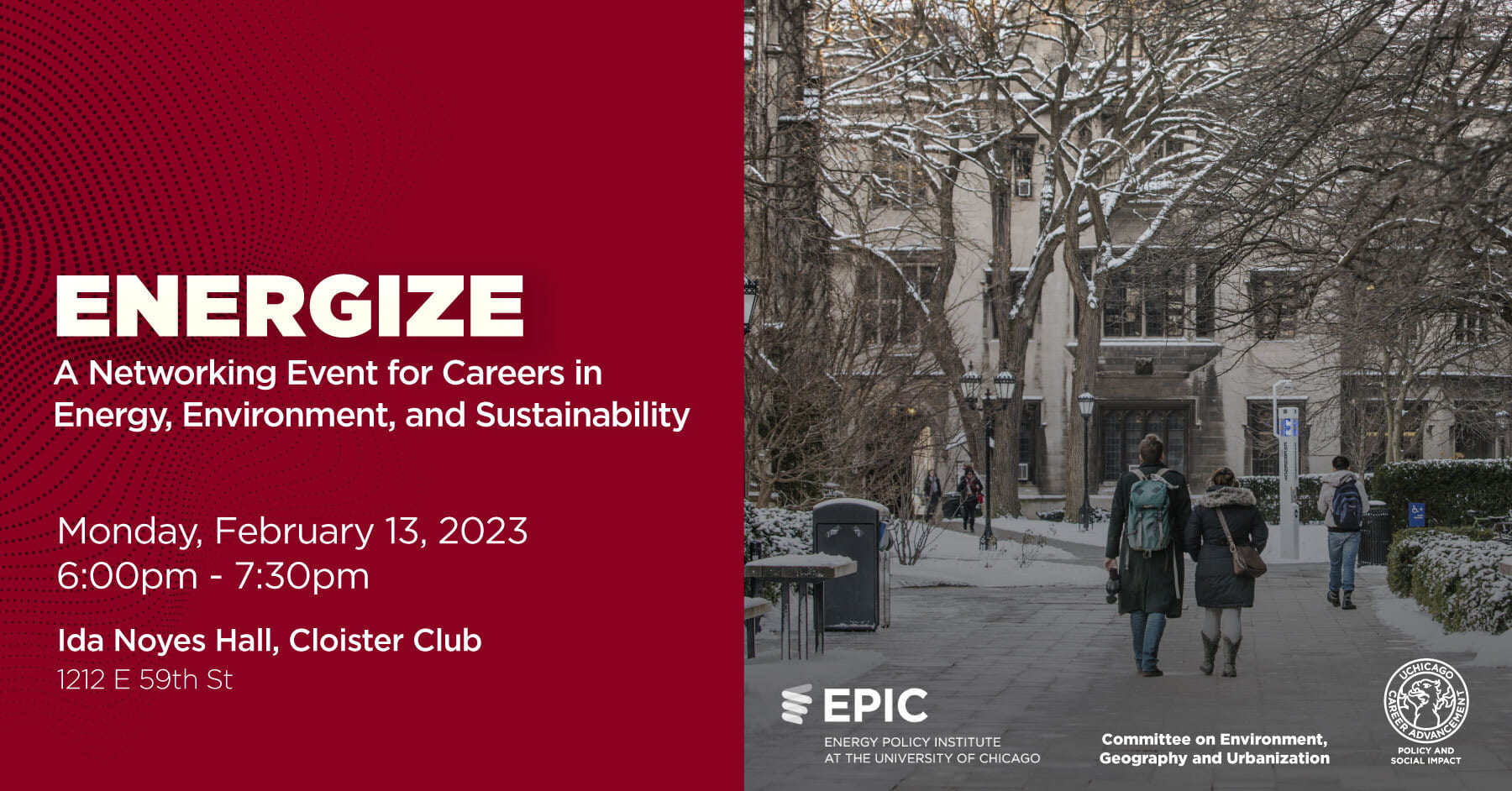
Student Event
Monday, February 13, 2023
6:00pm CT
Cloister Club, Ida Noyes Hall (1212 E. 59th St.)
More Info
Join EPIC, CEGU, and UChicago Career Advancement for the annual Energize event to network with professionals from across the sustainability, environmental, and energy fields. You will be able to meet with experienced professionals from organizations and companies such as the Invenergy, Green City Market, Shedd Aquarium, the Delta Institute, and more. Students will speak to panelists in small groups about their career experiences and how to succeed in various fields.
If you have any questions about access or to request any reasonable accommodations that will facilitate your full participation in this event such as ASL interpreting, captioned videos, Braille or electronic text, food options for individuals with dietary restrictions, etc. please contact the event organizer or Career Advancement at careeradvancement@uchicago.edu.↗
CEGU Event
Nancy Fraser, The New School
Jason W. Moore, Binghamton University
Aaron Jakes, University of Chicago (moderator)
Friday, February 10, 2023
12:00pm CT
Room 142, 1155 E. 60th St.
More Info
In this public dialogue, two of the leading social theorists of our time discuss the origins, manifestations and consequences of environmental crisis on our rapidly warming planet.
Over the last decade, political theorist Nancy Fraser and historical geographer Jason W. Moore have been among the most influential and systematic proponents of the claim that contemporary environmental emergencies are best understood in relation to—and as a direct expression of—capitalism’s underlying crisis-tendencies. On this understanding, the accumulation of capital is not simply a social or economic process that engenders damaging ecological effects. Rather, capital is itself a way of organizing nature, and thus environmental disasters such as global warming and biodiversity loss reflect its systematic devaluation or “cheapening” of the entire planetary web of life in both human and nonhuman forms. These operations are obscured, they argue, in dominant market-centric and technoscientific discourses, which treat nature as an exterior parameter or infinitely renewable resource supply for human consumption. In contrast, Fraser and Moore seek to draw attention to the “hidden abodes” of human and nonhuman reproductive work that support the operations of capital, and indeed, life itself on planet earth.
Moore and Fraser have been developing closely parallel lines of argument and discussing each other’s work for quite some time. In this conversation, moderated Professor Aaron Jakes of the Department of History, these eminent scholars will share the stage to consider what their respective approaches to an account of “capitalism’s natures” might offer to scholarship on the climate crisis, and to ongoing struggles to create more equitable, democratic, and livable ways of organizing our shared planetary existence.
Please note, this event will take place in person only. A recording will be made available shortly afterwards.
3CT New Book Salon
Nancy Fraser, The New School
Ryan Cecil Jobson, University of Chicago (interlocutor)
Lisa Wedeen, University of Chicago (moderator)
Thursday, February 9, 2023
6:00pm CT
Seminary Co-op Bookstore, 5751 S. Woodlawn Ave.
More Info
Please join us to celebrate Nancy Fraser’s recent book, Cannibal Capitalism: How Our System Is Devouring Democracy, Care, and the Planet—and What We Can Do About It (Verso Books, 2022). Fraser will be joined in conversation by CEGU faculty Ryan Cecil Jobson as interlocutor and Lisa Wedeen as moderator.
Capital is currently cannibalizing every sphere of life–guzzling wealth from nature and racialized populations, sucking up our ability to care for each other, and gutting the practice of politics. In this tightly argued and urgent volume, leading Marxist feminist theorist Nancy Fraser charts the voracious appetite of capital, tracking it from crisis point to crisis point, from ecological devastation to the collapse of democracy, from racial violence to the devaluing of care work. These crisis points all come to a head in Covid-19, which Fraser argues can help us envision the resistance we need to end the feeding frenzy.
What we need, she argues, is a wide-ranging socialist movement that can recognize the rapaciousness of capital— and starve it to death.
This event is co-organized by the Chicago Center for Contemporary Theory (3CT) and CEGU.
Please note, this event will take place in person only.
Student Event
BA Thesis and Capstone Project Information Session
Wednesday, February 8, 2023
12:00pm CT
Math Lounge (first floor), 1155 E. 60th St.
& Zoom (hybrid event)
Economic History Seminar
Jason W. Moore, Binghamton University
Tuesday, February 7, 2023
5:00–6:00pm CT
SSRB Tea Room, 1126 E. 59th St. (2nd floor)
More Info
Jason W. Moore is an environmental historian and historical geographer at Binghamton University, where he is professor of sociology and leads the World-Ecology Research Collective. He is author or editor, most recently, of Capitalism in the Web of Life (Verso, 2015), Capitalocene o Antropocene? (Ombre Corte, 2017), Anthropocene or Capitalocene? Nature, History, and the Crisis of Capitalism (PM Press, 2016), and, with Raj Patel, A History of the World in Seven Cheap Things (University of California Press, 2017).
The organizers request that attendees read Jason Moore’s paper in advance. Click here to access the paper.
CEGU Book Event
Manuel P. Teodoro, University of Wisconsin-Madison
Sabina Shaikh, University of Chicago (interlocutor)
Thursday, February 2, 2023
6:00pm CT
Seminary Co-op Bookstore (5751 S. Woodlawn Ave.)
More Info
The burgeoning bottled water industry presents a paradox: Why do people choose expensive, environmentally destructive bottled water, rather than cheaper, sustainable, and more rigorously regulated tap water? The Profits of Distrust links citizens' choices about the water they drink to civic life more broadly, marshalling a rich variety of data on public opinion, consumer behavior, political participation, geography, and water quality. Basic services are the bedrock of democratic legitimacy. Failing, inequitable basic services cause citizen-consumers to abandon government in favor of commercial competitors. This vicious cycle of distrust undermines democracy while commercial firms reap the profits of distrust – disproportionately so from the poor and racial/ethnic minority communities. But the vicious cycle can also be virtuous: excellent basic services build trust in government and foster greater engagement between citizens and the state. Rebuilding confidence in American democracy starts with literally rebuilding the basic infrastructure that sustains life.
Please join CEGU for a discussion between co-author Manny Teodoro and CEGU Director of Academic Programs Sabina Shaikh for a conversation about the book at the Seminary Co-op Bookstore.
Student Event
BA Thesis Chat
Wednesday, January 18, 2023
3:30–5:00pm CT
Room 129, 1155 E. 60th St.
More Info
This event is open to all UChicago undergraduates. Third- and Fourth-Year ENST majors are encouraged to attend.
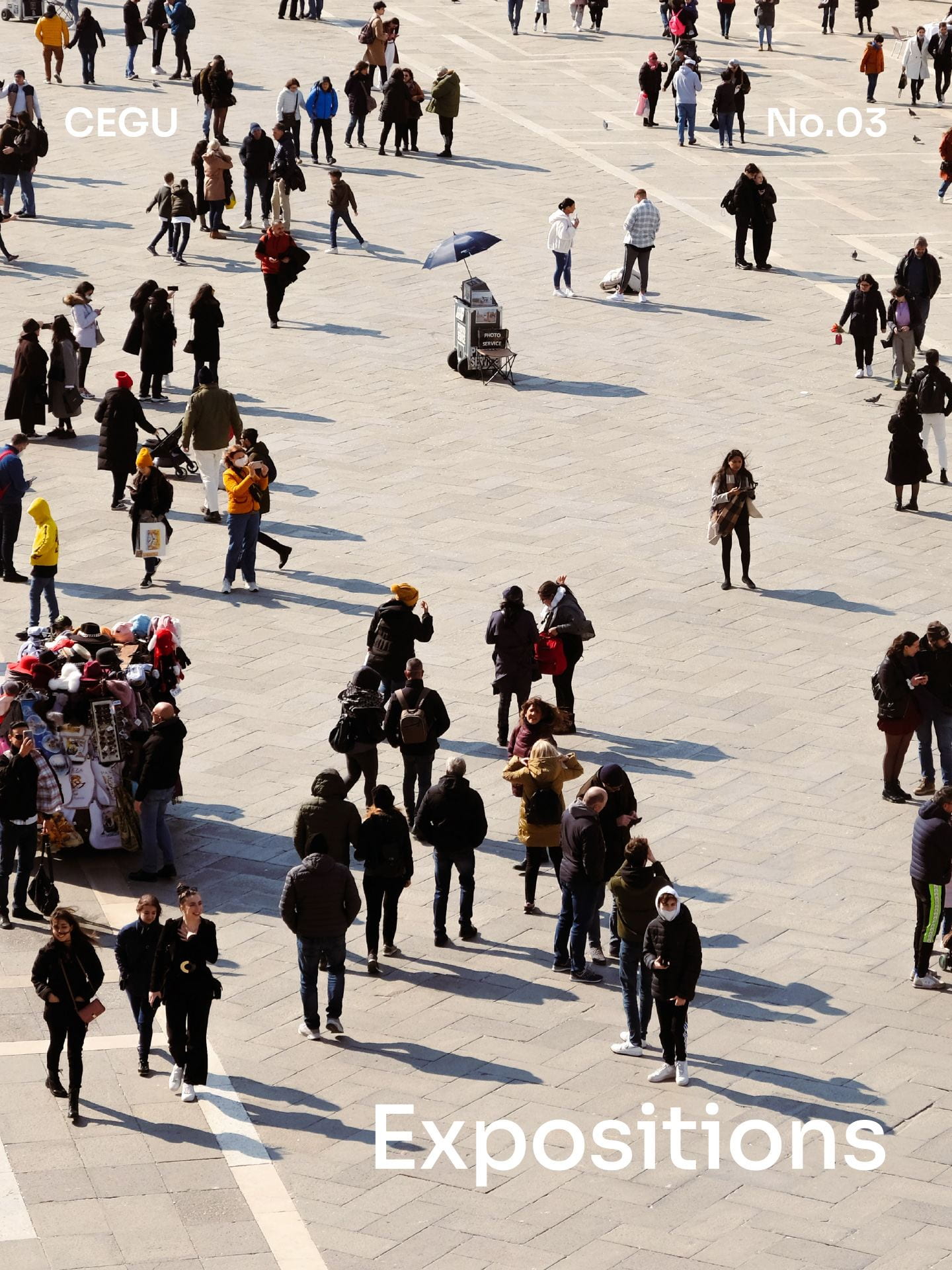

Student Event
Expositions Launch Party
Friday, January 13, 2023
4:30pm CT
Urban Lounge, 1155 E. 60th St.
CEGU Event
Jeff Hou, University of Washington
Stephanie Wakefield, Life University
Evan Carver, University of Chicago (moderator)
Thursday, January 12, 2023
5:00–6:30pm CT
Room 142, 1155 E. 60th St.
More Info
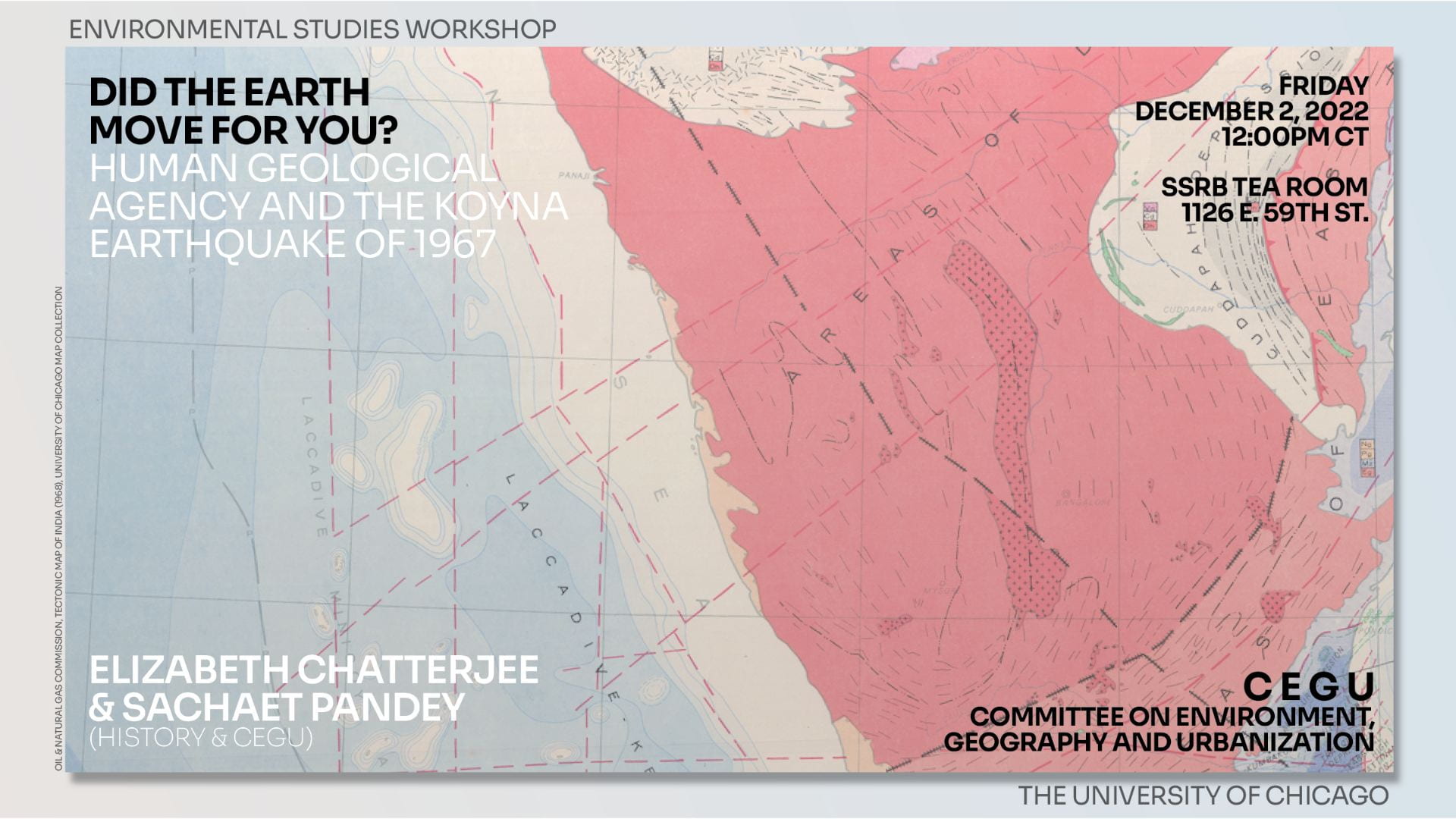
Environmental Studies Workshop
Did the Earth Move for You? Human Geological Agency and the Koyna Earthquake of 1967
Sachaet Pandey, University of Chicago
Elizabeth Chatterjee, University of Chicago
Friday, December 2, 2022
12:00pm CT
SSRB Tea Room (1126 E. 59th St.)
More Info
Environmental Studies Workshop
Bathsheba Demuth, Brown University
Matthew Johnson, Harvard University
Owain Lawson, University of Toronto
Jen Rose Smith, University of Wisconsin-Madison
Alexander Arroyo, University of Chicago (moderator)
Elizabeth Chatterjee, University of Chicago (moderator)
Friday, November 18, 2022
12:00pm CT
Harper 104 (1116 E. 59th St.)
More Info
The historical geographies of extractivism and empire cut across the division between “Global North” and “Global South.” This roundtable brings together scholars working on the Russian and North American Arctic, Brazil, and Lebanon for a conversation across regions rarely placed in the same frame. We will trace the surprising parallels and uncanny connections between histories of energy extraction and ecological transformation on very different colonial and capitalist resource frontiers. We will explore, too, sources of hope: the nodes of resistance and alternative imaginaries generated by projects of Indigenous and decolonial worldmaking.
This session of the Environmental Studies Workshop is co-sponsored by the Urban Theory Lab and the Neubauer Collegium Project on Fossil Capitalism on the Global South.
CEGU Event
Chandana Anusha, Northwestern University
Rachel Gittman, East Carolina University
Liz Koslov, UCLA
Michael Fisch, University of Chicago (moderator)
Thursday, November 17, 2022
4:30–6:00pm CT
Classics 110 (1010 E. 59th St.) & Zoom Webinar
More Info
Climate change is dramatically transforming the planet’s coastal terrains, rendering densely settled communities, vibrant ecosystems, and large-scale infrastructure vulnerable to an unprecedented range of threats. Insofar as coastlines typically constitute the borders of national states and their geopolitical operations, they are also at the core of planetary environmental, economic and societal transformations. From industrial ports, large-scale metropolitan regions and long-distance transportation corridors to coastal fishing villages, mudflats, wetlands, and marshes, coastlines represent multidimensional spaces of interface between heterogeneous ecologies and infrastructural configurations; national, regional and urban economies; multinational corporations; diverse forms of territorial governance; and regionally embedded circuits of social reproduction. These vital but delicate spaces are in peril.
How should we understand these transformations? What are their implications for inherited forms of social life, spatial organization, and territorial governance? What kinds of interventions might be imagined and mobilized to mitigate their effects not only upon coastlines, but upon the planet as a whole?
This panel brings together scholars from diverse fields—including urban planning, anthropology, sociology, landscape design, and architecture—whose work addresses emerging coastal vulnerabilities, transformations and crises in various sites around the world; their uneven social and spatial impacts; and emergent strategic responses. It will present an interdisciplinary conversation with the aim of generating new approaches to understanding—and shaping—the rapidly mutating environmental conditions of our time.
Student Event
BA Thesis Chat
Wednesday, November 9, 2022
12:00–1:30pm CT
Room 129, 1155 E. 60th St.
More Info
Environmental Studies Workshop
Green Places, Green Aesthetics: (Re)producing Vulnerability and the Spatial Politics of Street Tree Planning in Chicago
Nina Olney, University of Chicago
Friday, November 4, 2022
12:00pm CT
SSRB Tea Room (1126 E. 59th St.)
More Info
The recently-announced Our Roots Chicago plan from Mayor Lori Lightfoot in Chicago, intended to plant an additional 75 thousand trees in ‘vulnerable’ neighborhoods, was met with surprise controversy when several community organizations protested what they deemed to be the potential for environmental gentrification. Troubling the notion of trees as ‘ahistorical’ or ‘apolitical,’ this paper examines how Chicago residents, in pointing to the ways in which the planting of new trees may not be truly sustainable for their communities, reveal deeper connections between the processes of sustainable development and regimes of racial hierarchy in America’s cities. Expanding on Brandi Summers’ work on “Black aesthetic emplacement,” this paper examines how debates around sustainability become the place of contestation over the modern city, wherein urban policymakers turn to a ‘green aesthetic,’ concealing larger histories of environmental injustice, attaching symbols of sustainability to spatialized forms, and greening the image of the neighborhood—making it more appealing to private investment—rather than greening the neighborhood itself.
Nina Olney is an Instructional Assistant in the Committee on Environment, Geography and Urbanization (CEGU) and a recent graduate of the MAPSS program concentrating in Anthropology. Her research examines green gentrification in Chicago, specifically analyzing the role of street tree planning in transforming neighborhoods in terms of aesthetics, vulnerability, and access. Drawing on theories of racial capitalism, political ecology, and critical geography, her work centers the unseen elements of urban environments to trace a larger history of nature as property.
Student Event
Architectural Studies Open Studio: Built Environment Open House
Wednesday, November 2, 2022
5:00–8:00pm CT
MADD Center, Crerar Library
More Info
Student Event
IRB Workshop
Wednesday, October 26, 2022
5:00–6:00pm CT
Room 129, 1155 E. 60th St.
More Info
Join Research Mentor Kristi Del Vecchio for a 60-minute workshop on the IRB (Institutional Review Board) application process. This session is especially relevant for ENST thesis writers who intend to conduct research with human subjects (e.g. surveys, interviews, participant observation, etc.). The main goal of the workshop is to review the procedures and requirements for the IRB application in order to help students prepare for this process.
This event is open to all current UChicago undergraduates. Snacks will be provided.
Student Event
BA Thesis Chat
Friday, October 21, 2022
1:30–2:30pm CT
Room 129, 1155 E. 60th St.
More Info
Join Research Mentor Kristi del Vecchio and fellow thesis writers for an informal discussion on undergraduate research in Environmental and Urban Studies. Light refreshments will be served, and students will have an opportunity to share ideas and receive feedback on their projects.
This event is for third- and fourth-year ENST majors.
Student Event
Lunch Workshop on Qualitative Methods: Examples from Research on "Eco-Reproductive Ethics"
Kristi Del Vecchio
Friday, October 21, 2022
12:00–1:00pm CT
Room 129, 1155 E. 60th St.
More Info
Join CEGU Research Mentor Kristi Del Vecchio for an interactive session on qualitative methods in environmental studies research. Her dissertation focuses on “eco-reproductive ethics," interrogating the ways in which environmental concerns (such as climate change and biodiversity loss) are impacting reproductive choices and kinship practices in the U.S. In this session, Kristi will summarize her process for data collection and analysis, and discuss some of the literature that informs her approach. This lunch-n-learn is especially relevant for students who are interested in qualitative methods in their current or future research.
CEGU Event
A Roundtable with CEGU Faculty:
Alexander Arroyo
Sarah Fredericks
Amir Jina
Sarah Newman
Jennifer Scappettone
Sabina Shaikh (moderator)
Thursday, October 20, 2022
4:30–4:45pm CT—Welcome Reception
4:45–6:30pm CT—Roundtable Event
SSRB Tea Room (1126 E. 59th St.) & Zoom Webinar
More Info
Following the latest report of the Intergovernmental Panel on Climate Change (IPCC), UN secretary-general António Guterres declared that the earth “is on a fast track to climate disaster.” In order to avoid “tipping points that could lead to cascading and irreversible climate impacts,” secretary-general Guterres advocated an accelerated shift to renewable energy sources and a rapid downscaling of fossil fuel production and consumption. However, even as catastrophic floods, storms, heatwaves and fires proliferate across the planet, accompanied by devastating human suffering, population displacement, landscape destruction, and infrastructure damage, the fossil fuel industry remains globally dominant. While some governments seek to accelerate the transition to renewable energy and more sustainable social arrangements, many powerful states continue to subsidize fossil fuels and to grant permits for their continued exploration and extraction. Amidst these contradictory tendencies, climate activists and citizens around the world continue to develop strategies to protest the status quo, to pressure governments to limit or ban CO2-emitting machines, and to repair the massive social and environmental damage induced during the “long fossil boom” of the last 150 years.
Against the background of these intense transformations, crises and struggles, this panel of CEGU faculty considers the contribution of social science and humanities research to our ability to understand—and to shape—emergent environmental conditions, from the local to the planetary scales. The panel brings together scholars from diverse disciplinary locations—archeology, anthropology, economics, English, creative writing, geography, political ecology, philosophy, and public policy—to dialogue and debate about contemporary climate emergencies, their historical genealogies, their uneven geographies, their emergent dynamics, and their future implications. This event represents the first in a year-long series of discussions organized by CEGU to support research, teaching, and public dialogue about the social, historical, spatial and (geo)political dimensions of contemporary environmental transformations and crises.
EVENTS: 2021–22
CEGU Event
Animals, Territories, Environments
Matthew Gandy, University of Cambridge
Mindi Schneider, Wageningen University
Neil Brenner, University of Chicago (moderator)
Victoria Saramago, University of Chicago (moderator)
Friday, April 29, 2022, 12:30–2:00pm CT
Zoom
Lenticular Ontologies
Ghassan Hage, University of Melbourne
Wednesday, March 30, 2022, 5:00pm CT
SSRB Tea Room, 1126 E. 59th St. & Zoom (Hybrid Event)
More Info
People who have social and affective connections to a multiplicity of geographical locations, such as immigrants, are often portrayed as dwelling and being torn between places. In his recent book, The Diasporic Condition (University of Chicago Press, 2021), Ghassan Hage argues that this is not always the case; that rather than being torn between two or three places people are also capable of dwelling in all these places at the same time. One needs to pluralize one’s conception of what it means to dwell in and occupy a place, and the idea of inhabiting simultaneously a multiplicity of locations becomes easier to conceive. But to what extent do we all inhabit a multiplicity of realities? And if we do, what are the critical analytical consequences of approaching social existence in this way?
Ghassan Hage is professor of anthropology and social theory at the University of Melbourne in Australia. He is the author of several books, including White Nation, Against Paranoid Nationalism, After-Politics, and Is Racism an Environmental Threat?
Organized by the Chicago Center for Contemporary Theory (3CT); co-sponsored by the Pozen Family Center for Human Rights, the Department of Anthropology, and CEGU
Co-sponsored Event
Property, Personhood, & Police: Racial Banishment in Postcolonial Los Angeles
Ananya Roy, UCLA
Thursday, March 3, 2022, 5:00–6:00pm CT
Zoom
More Info
Organized by the Program on the Global Environment and the Pozen Family Center for Human Rights; co-sponsored by CEGU
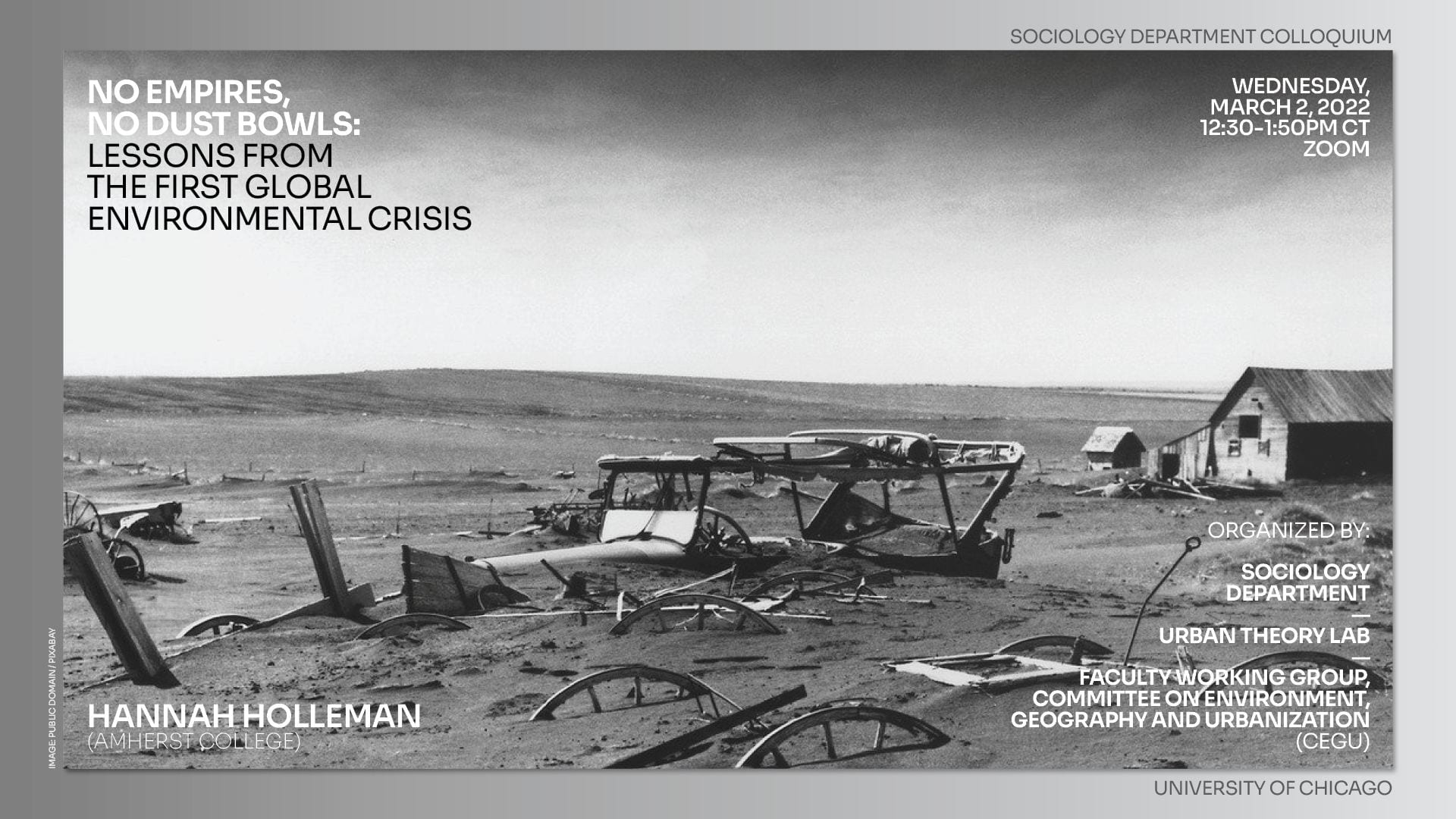
Co-sponsored Event
No Empires, No Dust Bowls: Lessons from the First Global Environmental Crisis
Hannah Holleman, Amherst College
Wednesday, March 2, 2022, 12:30–1:50pm CT
Zoom
More Info
Organized by the Department of Sociology; co-sponsored by CEGU
Energy Histories & Geographies
Thea Riofrancos, Providence College
Julie Klinger, University of Delaware
Ryan Cecil Jobson, University of Chicago (moderator)
Thursday, February 24, 2022, 4:30–6:00pm CT
Zoom
Climate & the Legacies of Empire
Sunil Amrith, Yale University
Keston Perry, Williams College
Elizabeth Chatterjee, University of Chicago (moderator)
Thursday, February 10, 2022, 4:30–6:00pm CT
Zoom
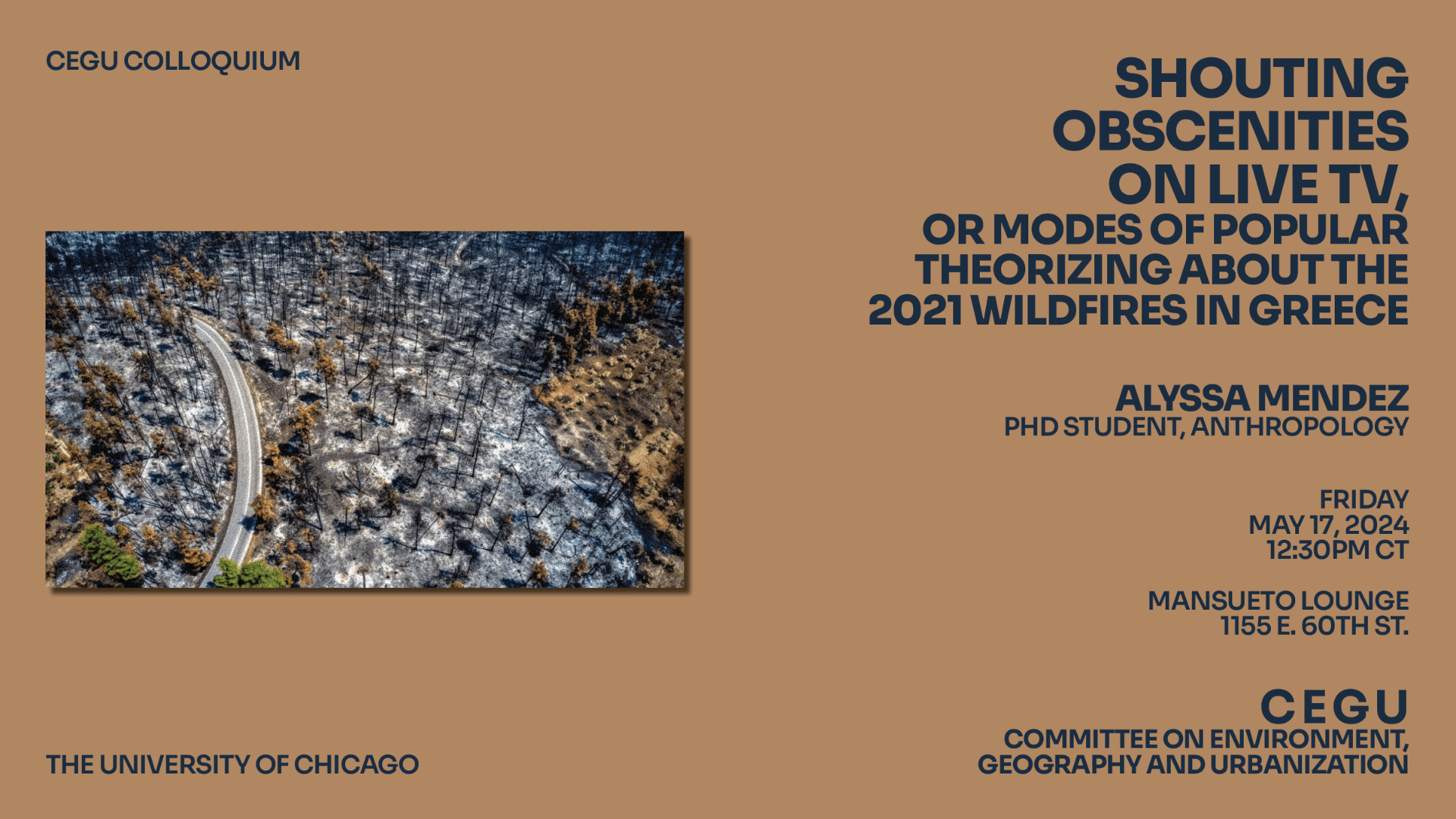



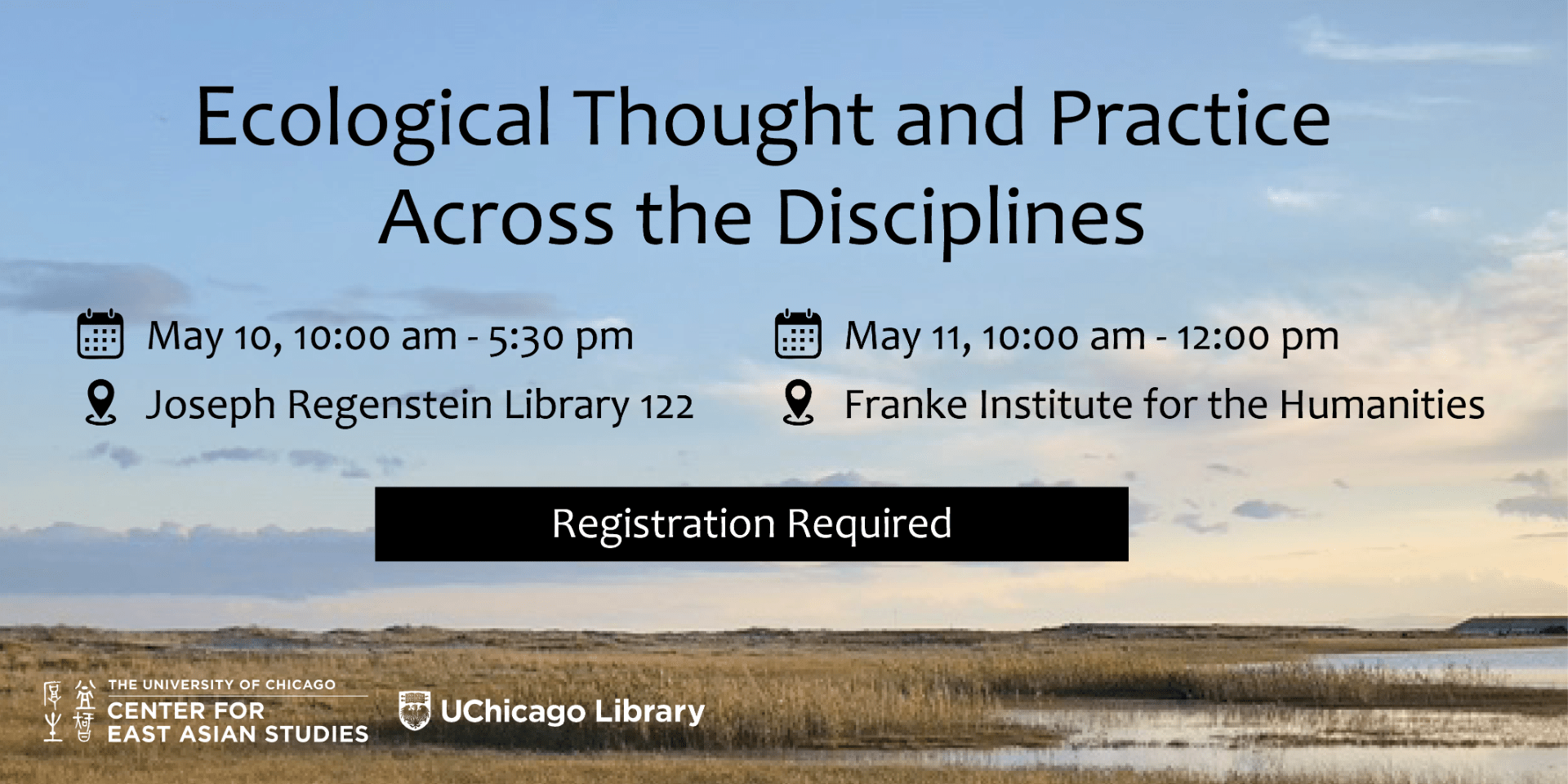

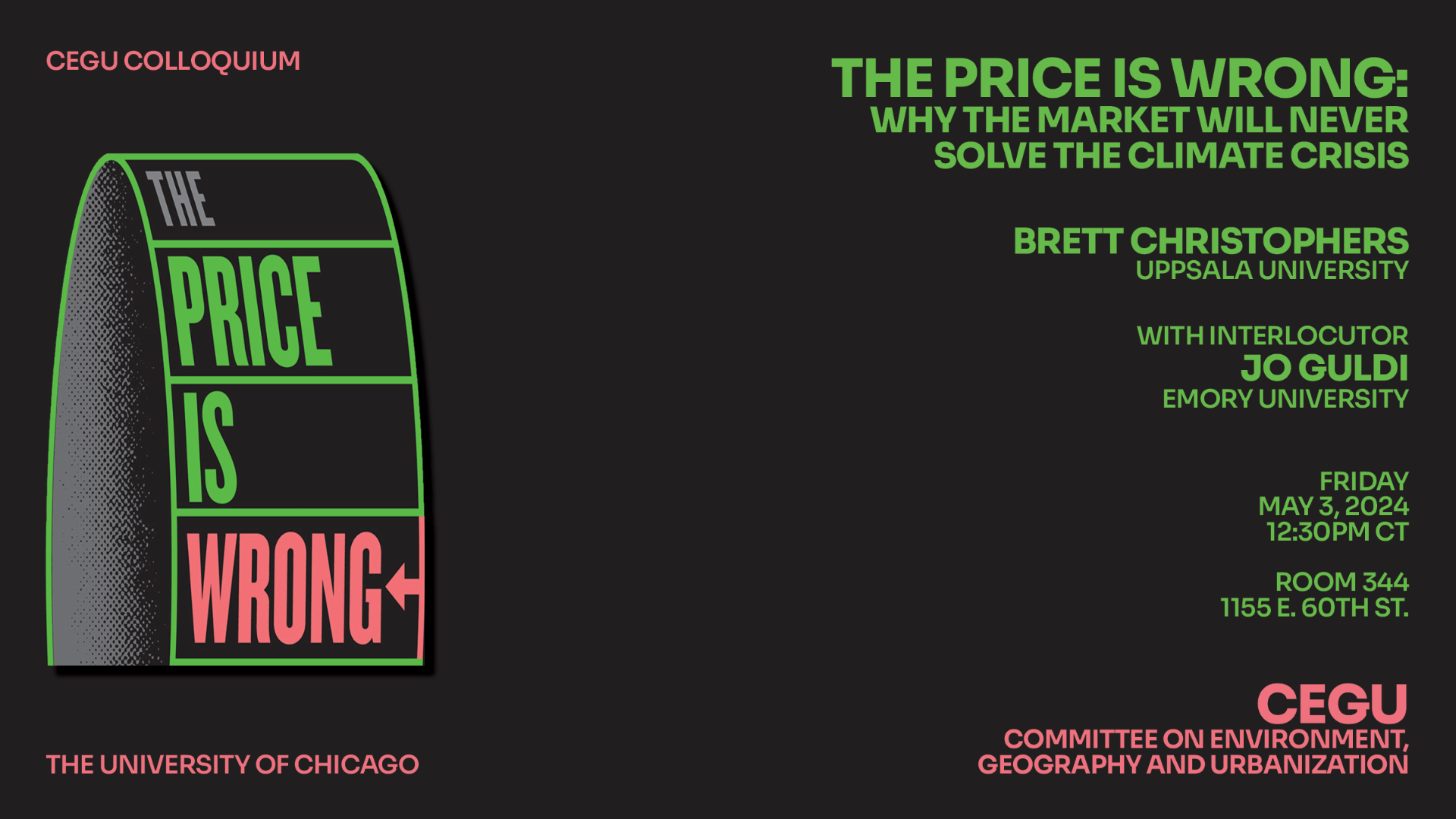
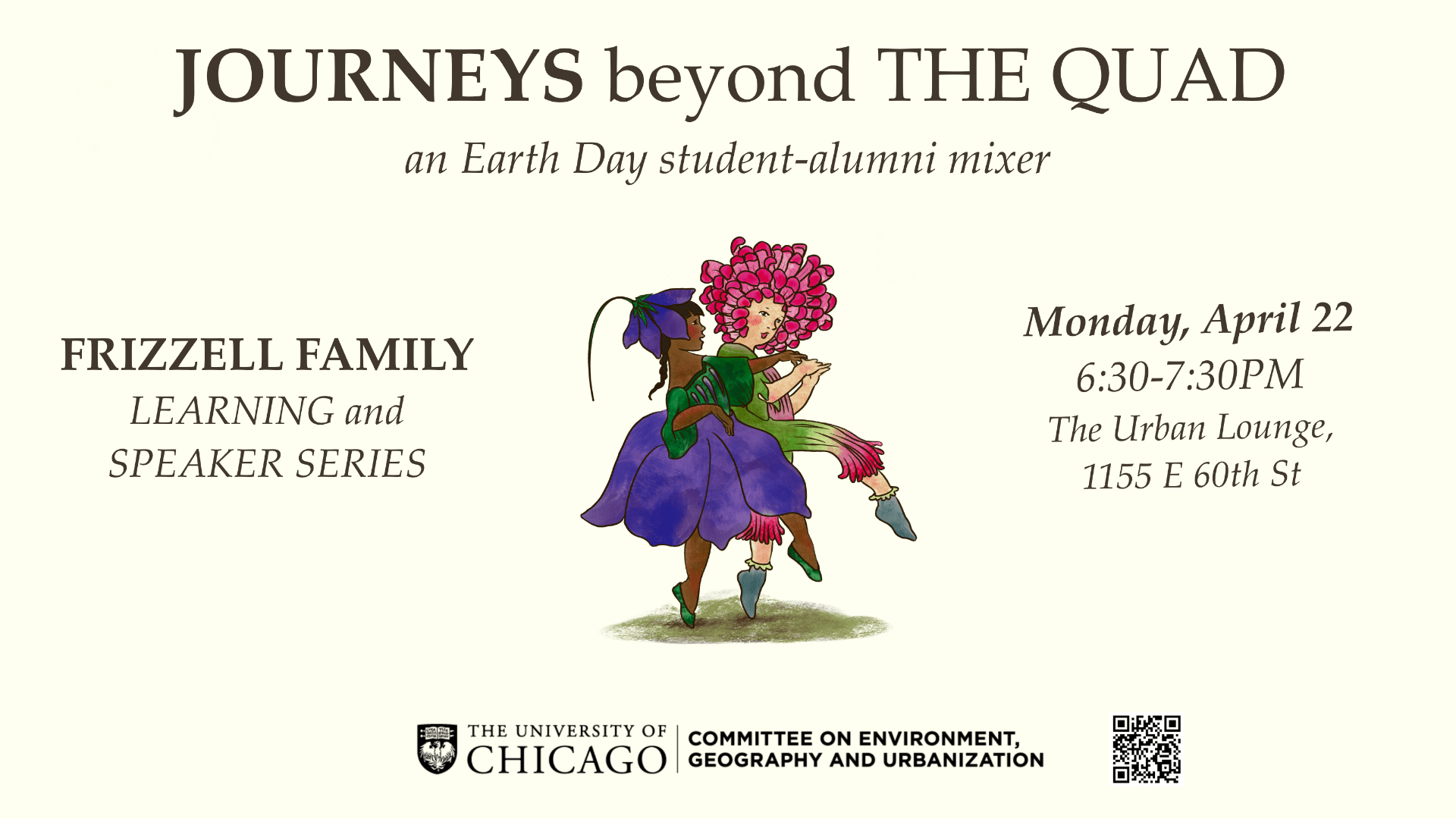
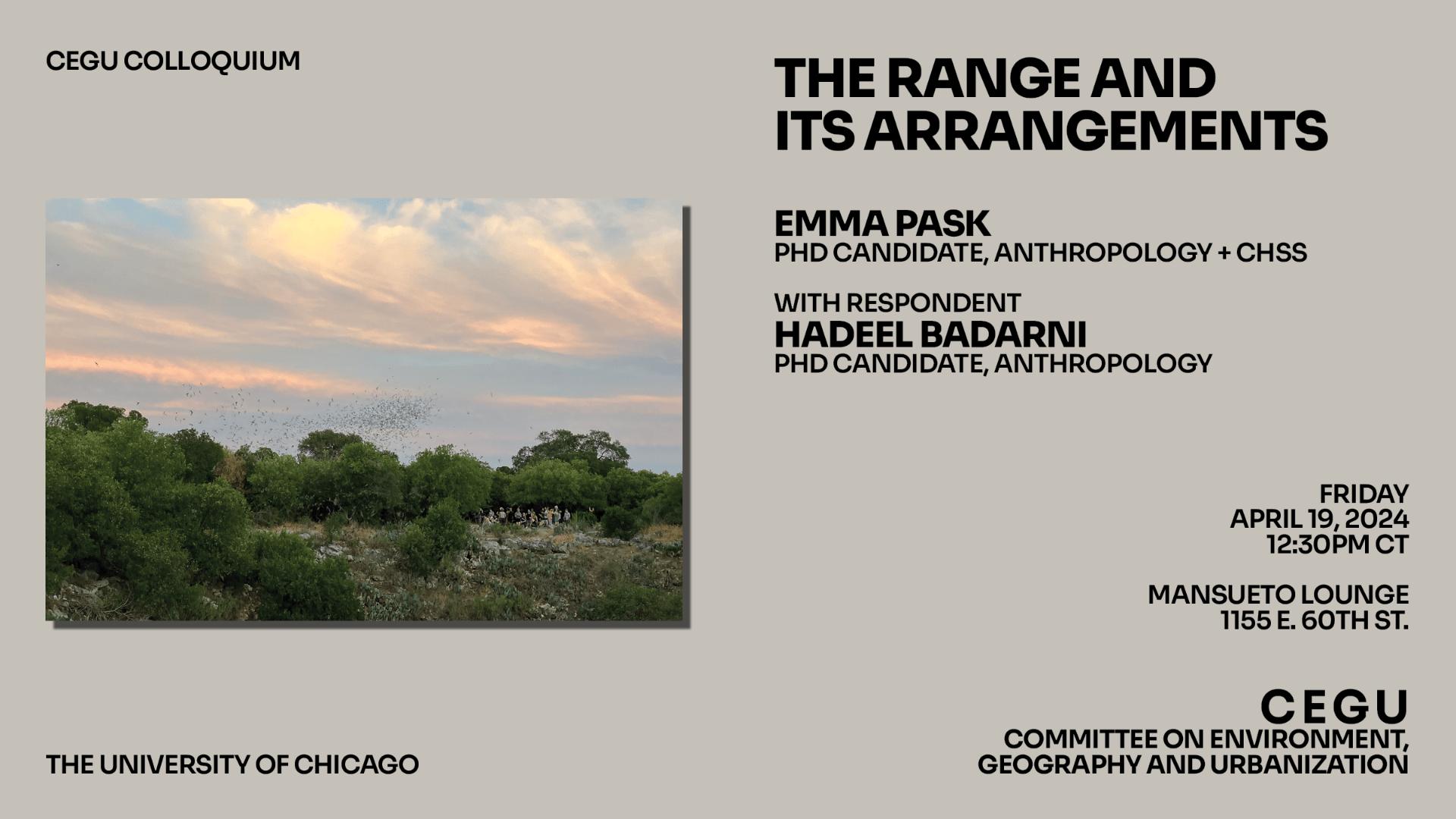
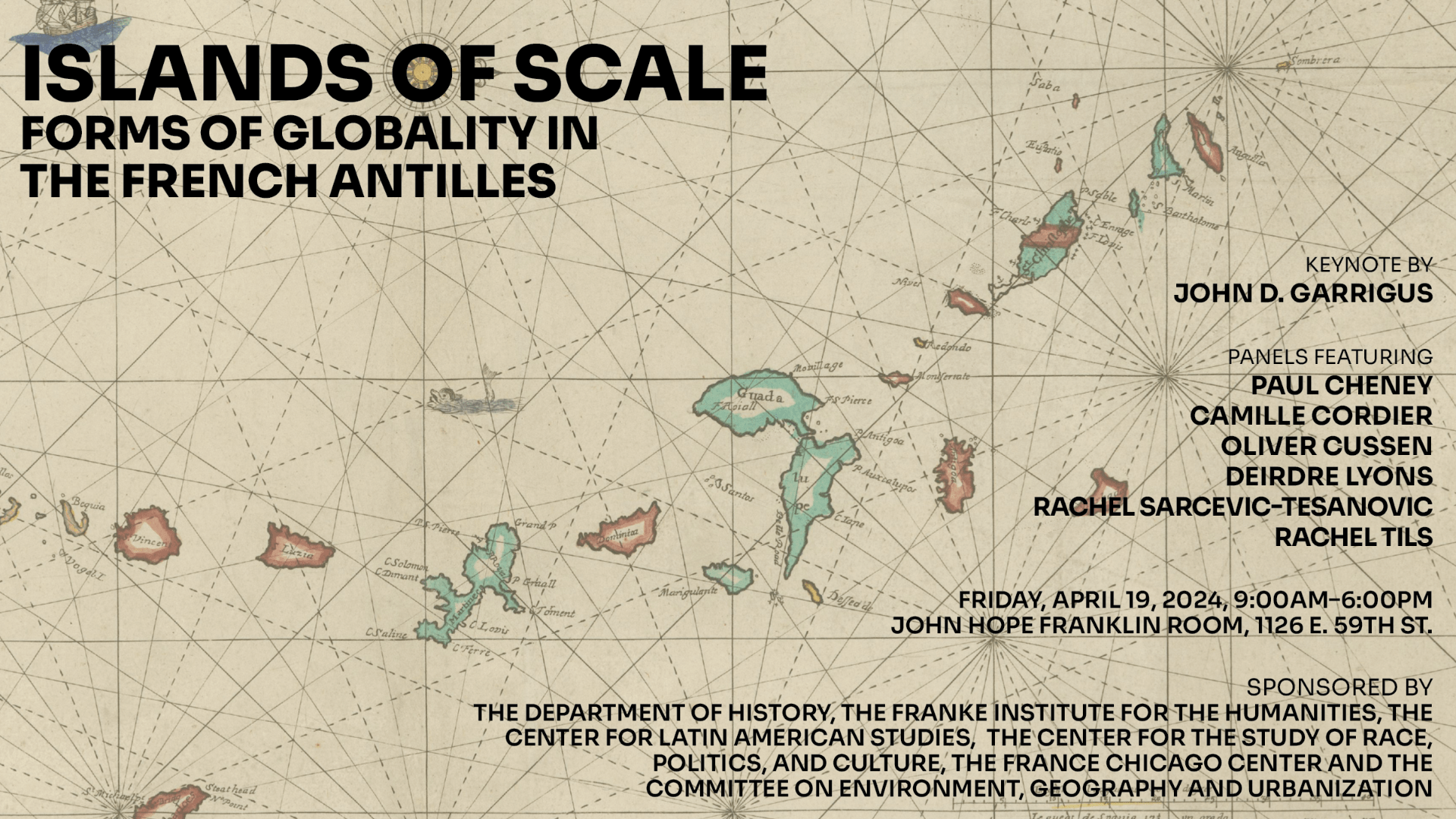
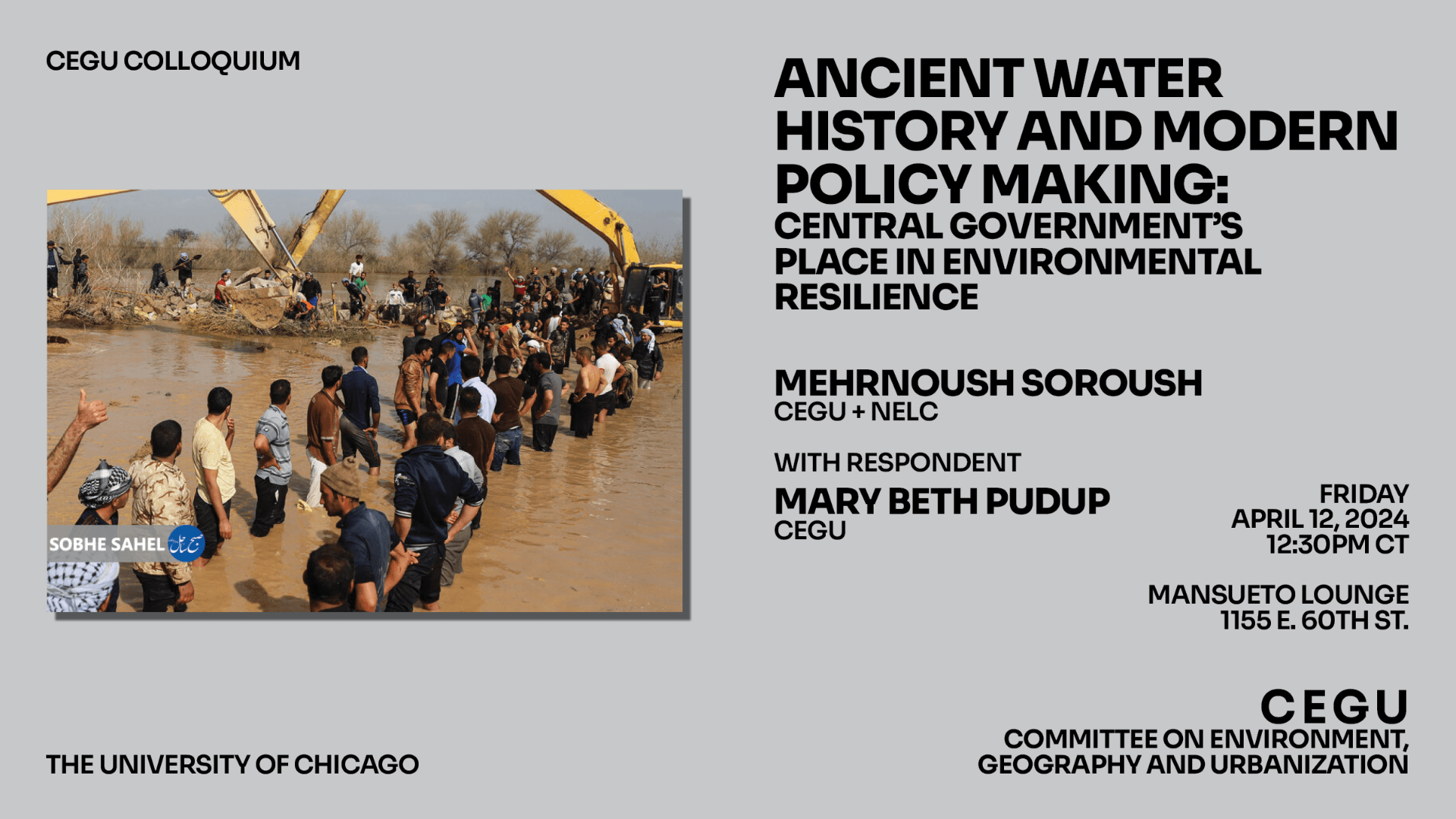
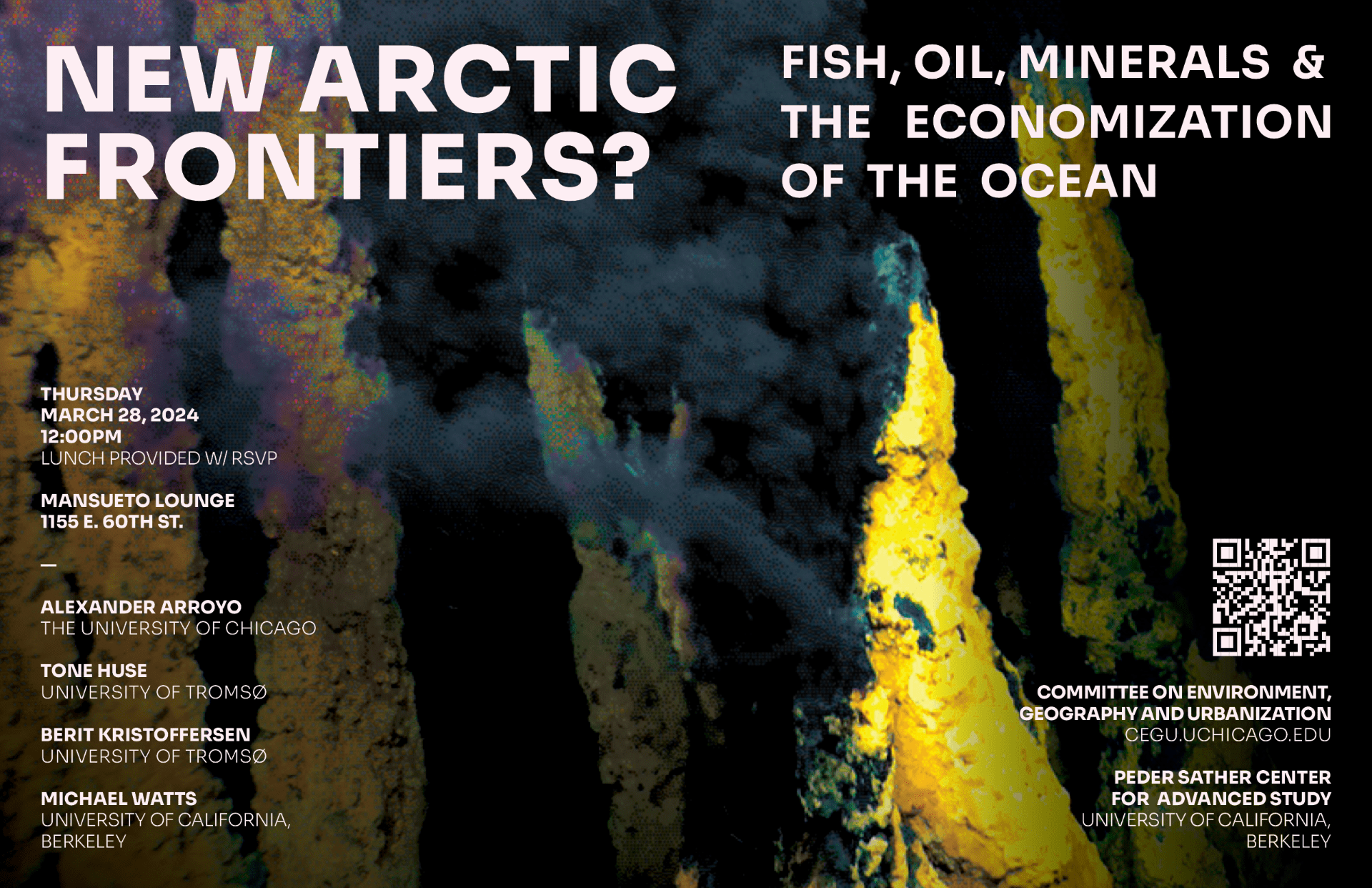
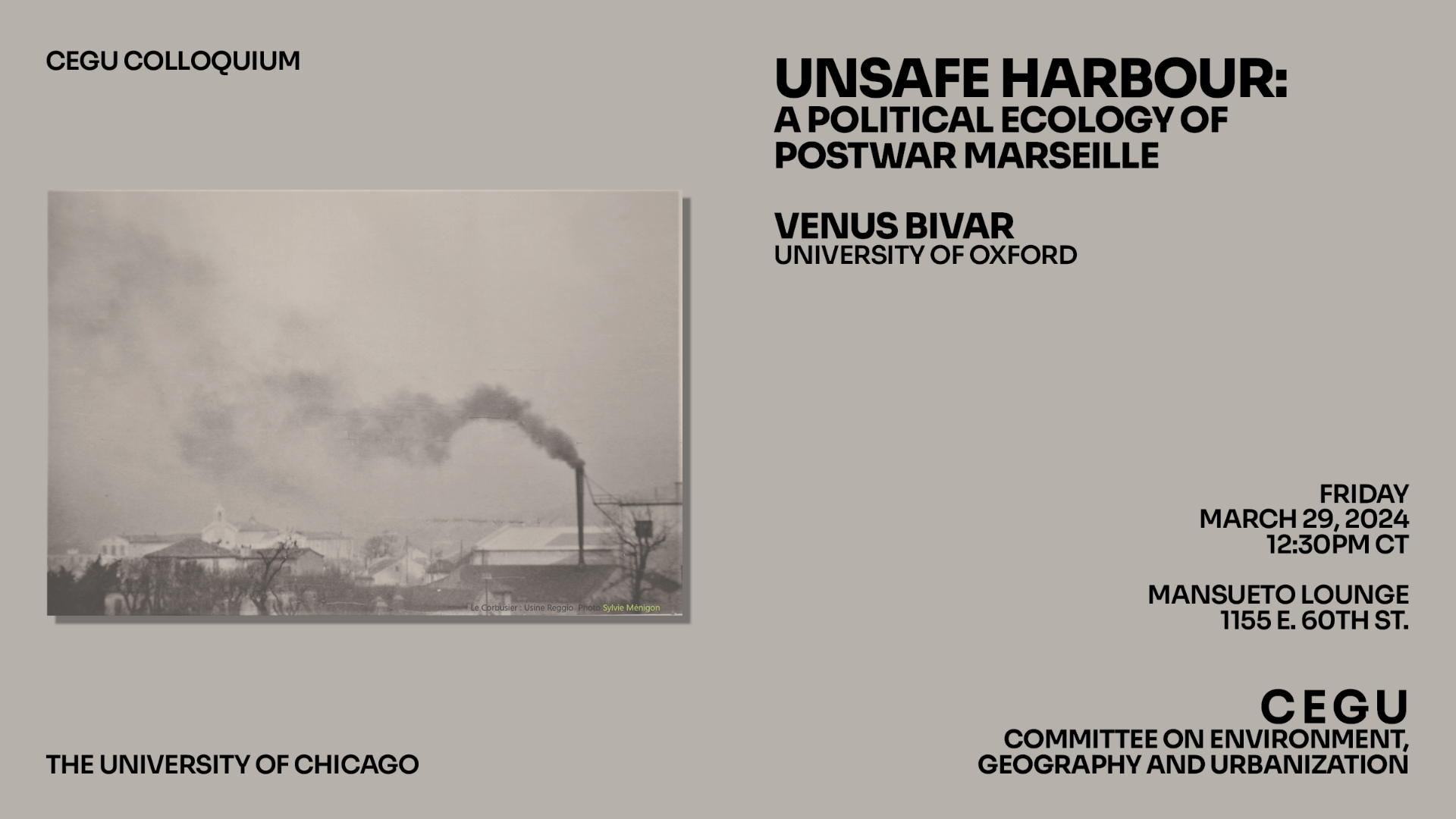
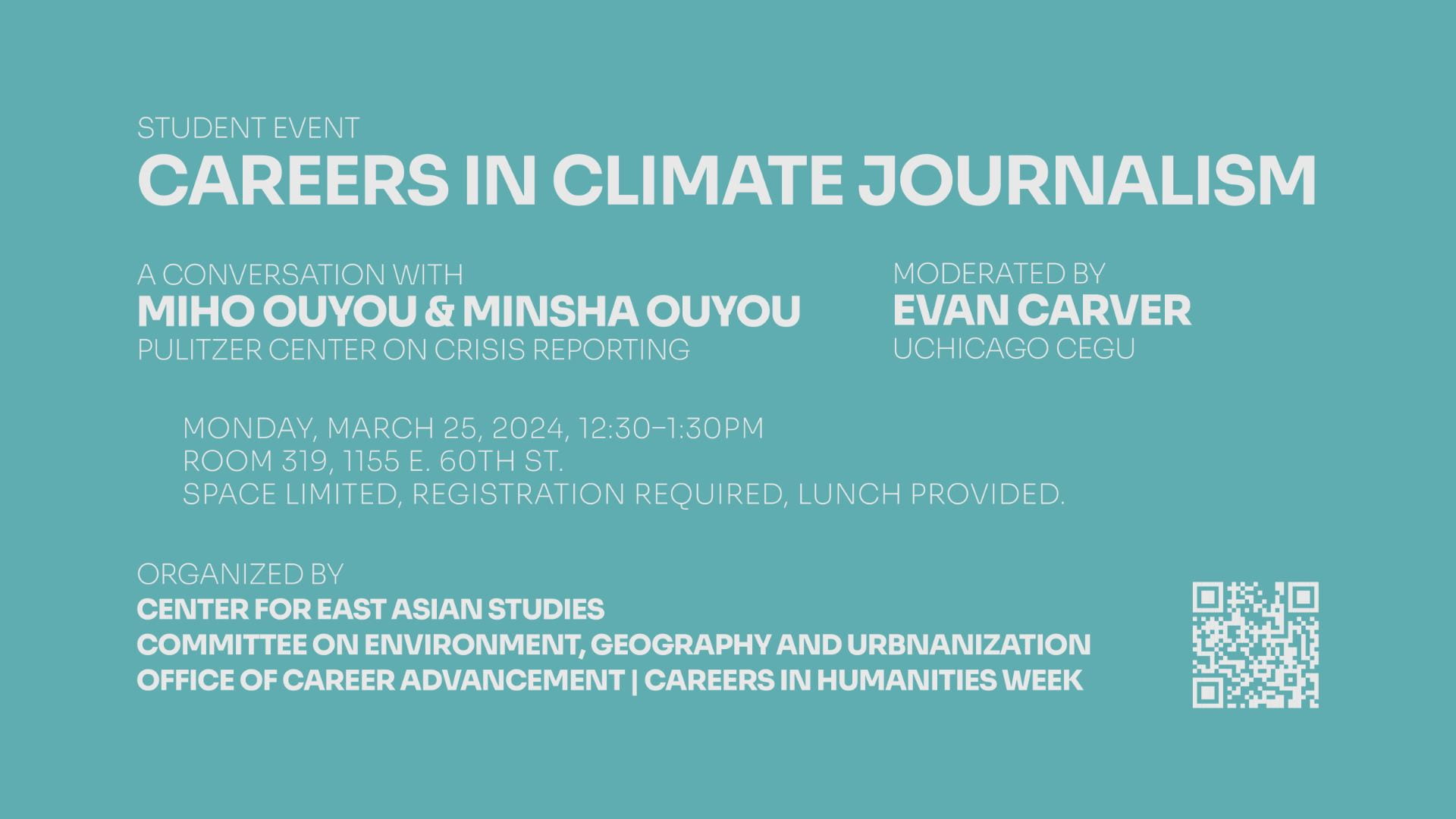
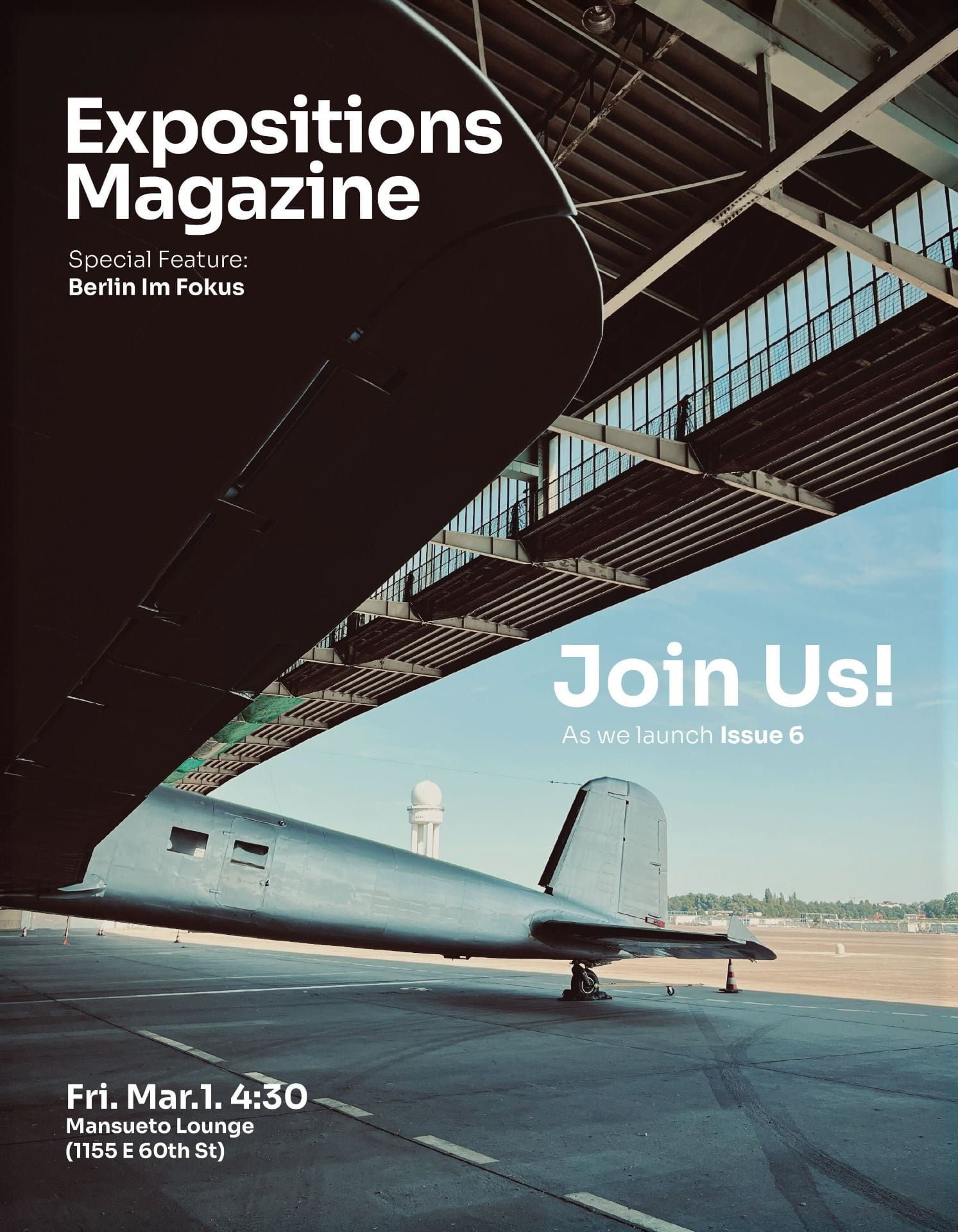
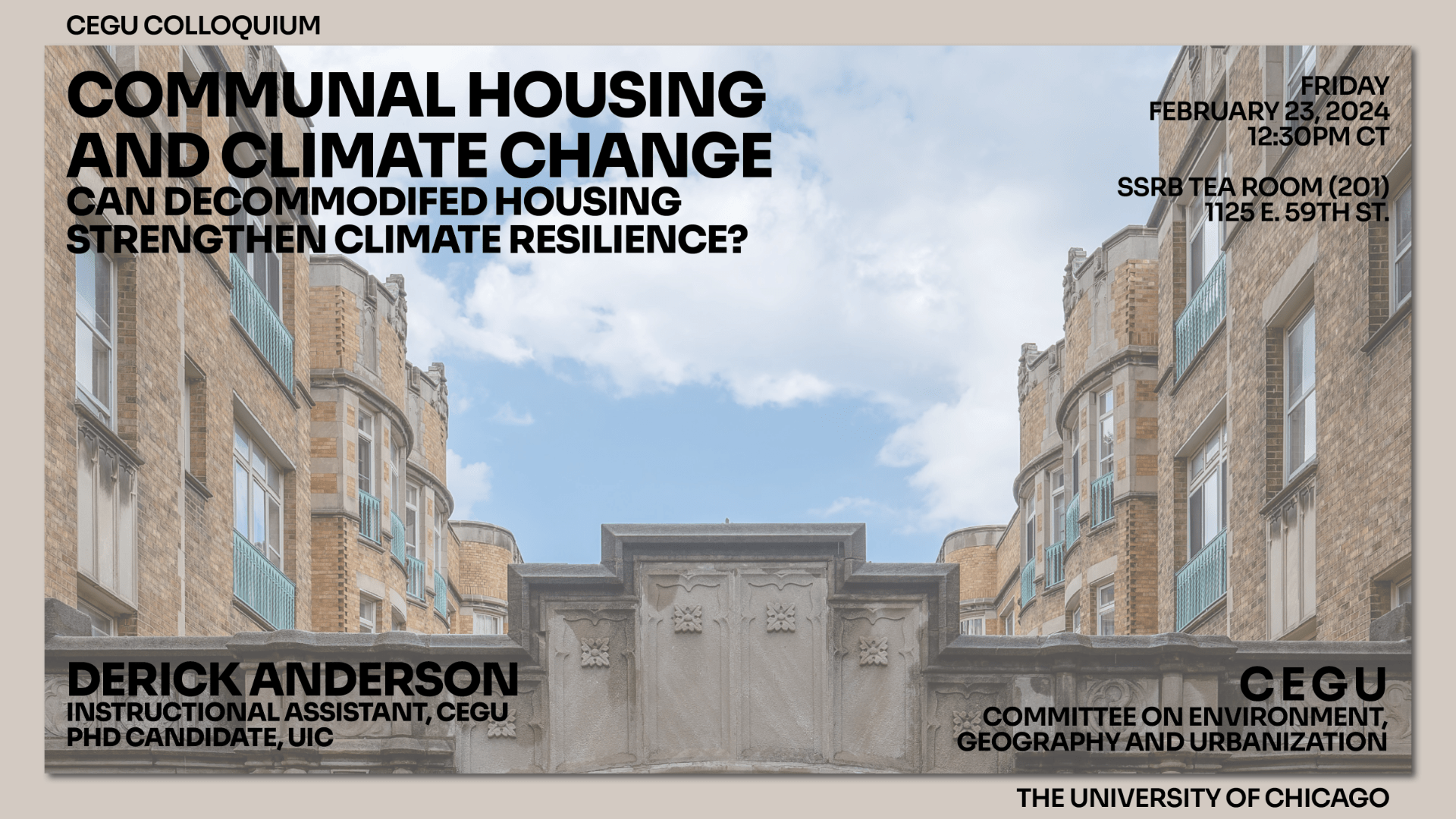
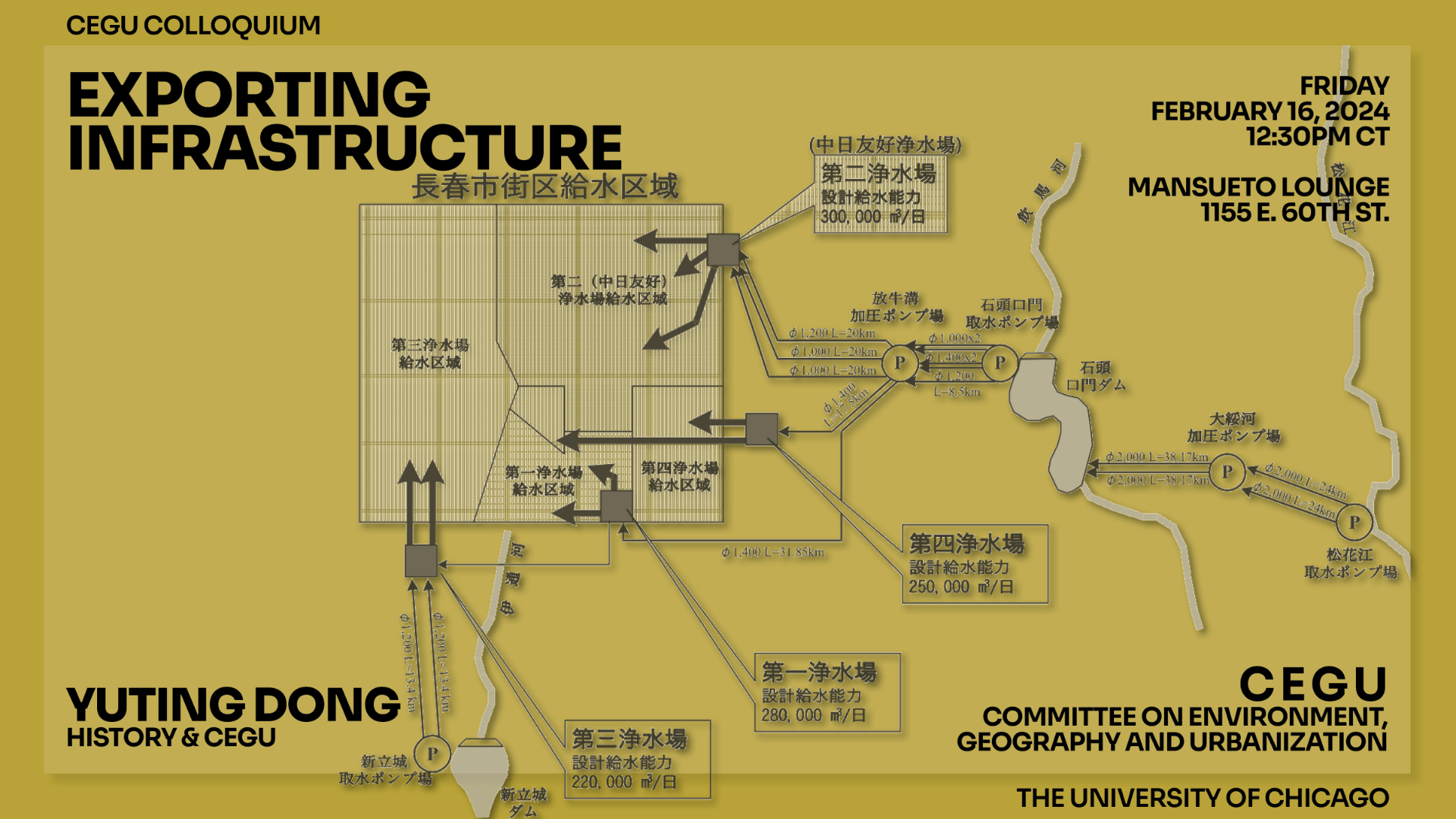
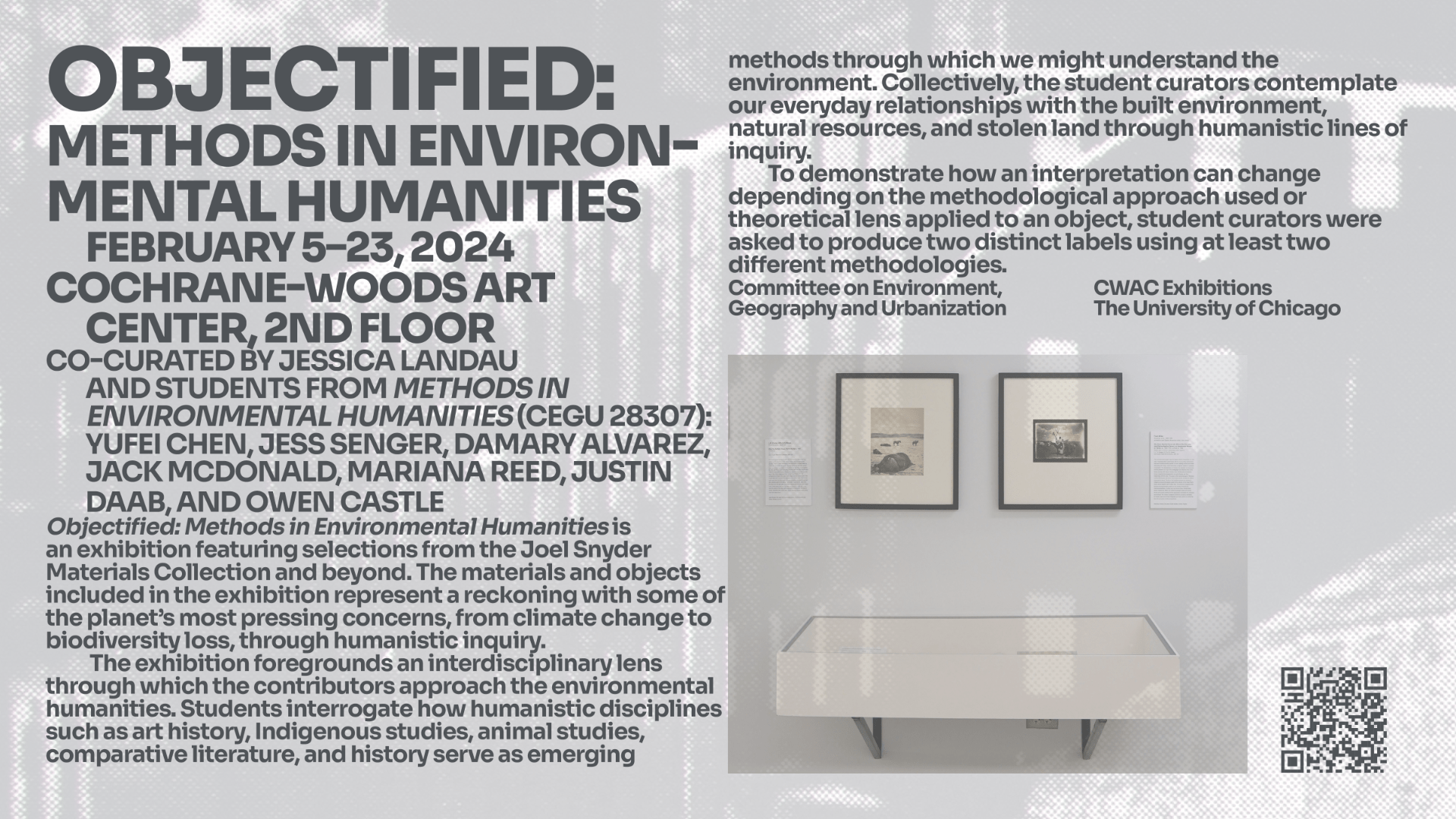

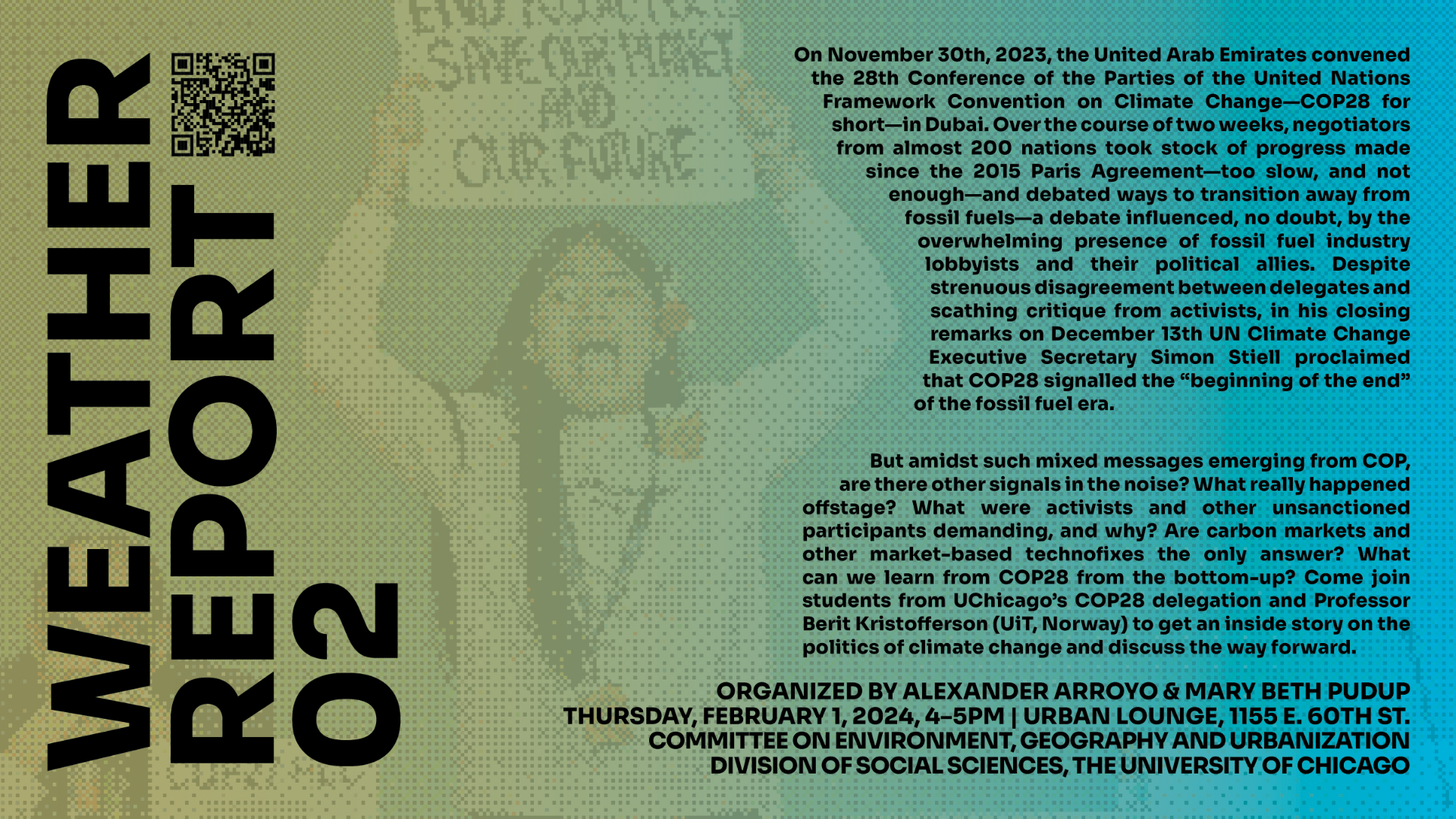

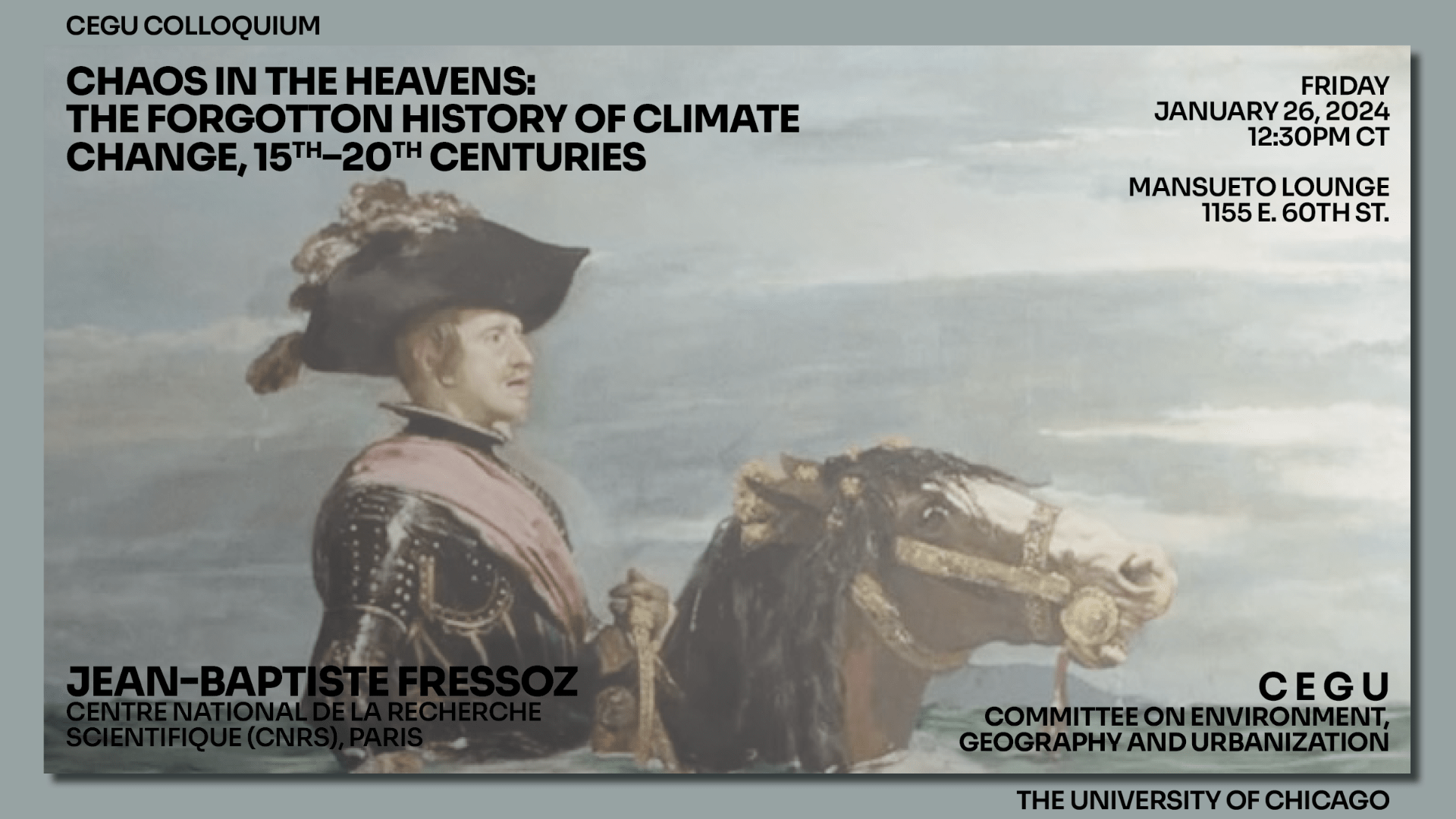

![01-16-2024 COP Poster (Final)[82] Poster for "Finding Your Audience: Using Sources, Data, and Visuals;" November 13, 2023 CEGU student event](https://voices.uchicago.edu/cegu/files/2024/01/01-16-2024-COP-Poster-Final82-9dd05bd4dbe07cc6.png)

